#German Occupied France
Explore tagged Tumblr posts
Text
Salt in Our Wounds - Chapter II
Summary-> You've brought the unconscious and injured man into your home. Now, you and Edmund attempt to get him medical attention, while figuring out who he is, and what side he's on.
Pairing-> Gus March-Phillipps/Reader
Word Count-> 4.8k
Chapters-> I
Warnings-> PG: Blood, Language, Infidelity, Fluff, Medical Treatment
Inspiration-> Since my favorite demon, @littlefreya, asked so nicely. The one and only Chaos Major, Gus March-Phillipps.
Author’s Note-> I hope you enjoy! Line divider by @FIREFLY-GRAPHICS!
-> If you would like to get notifications for my writing! Just follow my Tag List blog, @VIKING-RAIDER-TAGLIST as well as my @VIKING-RAIDER-LIBRARY and turn on the notifications for it! It’s that easy!’


“What are we going to tell Papa, Edmund?” You whispered, looking at him suddenly.
Edmund pushed his jaw forward and rubbed his palms over the steering wheel. “You just leave that to me, Peanut.” He replied, hitting the village round-a-bout. “I'll talk to him. What we need to worry about is how we're going to get his bullet wound treated.”
“Oh, no!” You gasped, feeling ridiculous for forgetting that.
“Relax.” Edmund cooed, turning onto your street. “I might have someone in mind, who could help us and keep their mouth shut.” He said, parking against your curb, instead of his.
“Who?” You frowned, blinking at him.
“Old man Tremblay.” He said, killing the engine. “He used to be the village's doctor, before his son-in-law, Thomas, took over for him. They both hate the Germans. So, I might be able to talk to Dr. Tremblay about coming over to the house. I'll say we need him to look at Pops. No offense to Thomas, but he's more comfortable with the old man, which is true. Once he's here, I'll explain the situation to him.”
“If he doesn't help us?” You asked, chewing on your lip, worried.
“Then, we'll wing it.” He huffed, shoving his door open and getting out.
“Wing it.” You sighed, your hands trembling. “Right. Wing it.” You gulped, getting out and meeting your brother at the tailgate. “What end are we picking up first?” You asked, quietly.
“I'll grab his top end.” Edmund replied, casually. “No need for you to drop the poor bastard on his head. He's got enough issues.” He sighed, climbing into the truck. “We all do.” He mumbled under his breath. “Go, open the front door.” He said, jerking his head towards your modest cottage.
“Fair.” You replied, scurrying over and pushing the door open. “Papa, me and Edmund are bringing something in! Don't close the door, please!” You called inside, before rushing back to the truck, helping Edmund with your load.
You slide him half off the truck, enabling you to wrap your arms around his knees and calves, before Edmund managed the rest. Shuffling across the sidewalk and turning, so Edmund went in first, you stepped over the threshold into the cottage, feeling the heat of the fire your father had roaring in the grate.
“What in God's sake are you two bringing in!” Your father griped from the sitting room, where he occupied his favorite armchair.
“I'll explain in a minute, Pops!” Edmund wheezed back, kicking open the door to the cellar. “You go down first.” He bid you with a jerk of his chin. “Your side vision is better than mine, so you hopefully won't stubble down the stairs, while looking over your shoulder.”
“That's fine.” You nodded, turning so you could carefully go down the narrow steps into the dark basement below.
It was slow and cumbersome, but you and Edmund made it to the bottom. You sat your package down and unwrapped him. There were no windows into the basement, so there wasn't a need to hide or conceal him anymore.
“We can't lay him on the floor, Edmund.” You hissed at him, quietly.
“We're not, silly!” He growled back, shaking his head. “Pops has a camp bed up in the attic. Go, get it and bring it down here. We'll set it up in the cellar, he can lay on it.”
Nodding, you went back upstairs, peeking at your father as you came up, but found, to your relief, he had dozed off. Going upstairs and down the hallway, you reached up for a cord hanging from the ceiling and pulled it, revealing a hidden, folded ladder, leading up to the half attic. It took a few minutes for you to finally find the folded up, military green and canvas, camp bed. Once you were back in the basement with it, Edmund had the cellar door open and was waiting for you. He put the bed together like an expert, having gone on countless camping trips with it over his life.
“That should do it.” He sighed, wiping his face. “Let's get him in it, then I'll go talk to Dr. Tremblay.”
“All right.” You sighed back. “He doesn't seem to be bleeding as much.” You commented, once he was resting in the bed.
“Seems so.” Edmund agreed, narrowing his eyes at the wound in the dim lighting. “Whether or not it's a good or bad sign is yet to be determined.”
“Then, you should hurry and get the doctor.” You urged him, brow creasing gently as you looked up at him.
“I'm going. I'm going.” He defended, holding his hands up. “Can't a man take a breather?” He asked, wide eyed.
You reached out and took Edmund's hand. “I'm sorry. I'm just-”
“I know, Peanut.” Edmund interrupted, shaking his head at you. “You have a heart worth more than gold, itself.” He said softly, bending to kiss the top of your head. “With luck, I'll be back soon with Dr. Tremblay.” He called, heading out.
“You hear that?” You said, looking at the man. “We're going to get you looked after. You'll be right as rain again soon.” You smiled at him, though you weren't sure why. “How about I grab you a blanket?” You continued to babble at him. “You might get blood on it though.” You frowned, biting the corner of your lip, but scurried upstairs for a blanket and pillow anyway.
“What's that for, Peanut?” Your father asked, still half dozing.
“Oh, I just thought the basement spirit would like something comfortable to nap with.” You answered, pausing at the basement door, smirking over at him, knowing he wasn't listening.
“That's nice of you, love.” He slurred, head lolling forward.
You chuckled, continuing on. “Well, my father now thinks the basement is haunted.” You quipped, lightly spreading the blanket over your new housemate, then gently tucked the pillow under his head, noticing how sweaty his unruly, but short, curls were. “You've caught a fever.” You cooed, turning your hand to delicately rest it on his damp forehead. “Thankfully, it's cool down here.” You said, using the cuff of your blouse to dab at his sweaty brow.
“I'll be right back.” You hurried back upstairs, to the kitchen.
You grabbed a bowl from the cabinet and a dish towel from its hanger. Tossing the towel over your shoulder, you filled the bowl halfway with water and turned to the ice box and chipped ice from it, dropping some into the bowl. You made two trips between the upstairs and the cellar, taking a chair down there, before taking down the chilled water, so you had something to sit on as you gingerly dabbed his flushed forehead and face.
“Well, whoever you are.” You said, balancing the bowl in your lap. “It's a right mess this is.” You chuckled, before introducing yourself, feeling silly just sitting there in the silence. “I hope you're on our side or Edmund is going to have us both shot.”

Some of the heat in his skin cooled as you lightly draped the folded dish towel over his forehead, making you relieved to see him not so flushed.
You heard the door upstairs creak open and the floorboards overhead groan as heavy feet strode and shuffled over them. “That must be Edmund with Dr. Tremblay.” You commented, looking up at the dusty ceiling. “I should go up and check on them.” You said, standing up, setting the now warm bowl of water in your place on the chair.
“Edmund?” You called softly, appearing in the kitchen, where he was standing with a short, gray haired man, dressed in a wrinkled, brown three piece suit.
“Sshh.” He hushed you, casting an eye towards the sitting room and waved you closer. “As I was saying, Dr. Tremblay, I've brought you here not for my father, but for another matter entirely.” He continued, his voice low so as not to disturb your father.
Dr. Tremblay's bushy brows drew closer together, reminding you of a caterpillar. “Is that so?” He hummed, bringing his arthritic hand up to his chin. “Then, what was it you summoned me here for?”
Edmund's eyes twitched to yours for a moment, you nodded at him and he looked back to the good doctor. “I know you have no love for our occupiers, Dr. Tremblay, like I, myself, don't.”
“Ha!” He laughed, his head tipping back as he grinned. “Fripouilles!” He spat, with no small amount of venom.
“I agree, sir.” Edmund chuckled, smirking. “But, to the heart of the matter. My dear sister here, on her daily morning walk along the beach found something—someone, washed ashore.” He explained, his voice calm and steady, revealing no emotion or opinion. “We're sure he's of our morals. But he's been injured.”
“Injured?” Dr. Tremblay frowned, narrowing his ordinarily kind, but currently and understandably suspicious, brown eyes at him. “Injured how? Show me.”
“I would rather tell you.” Edmund answered, biting his lip. “In case, you wish not to have any further dealings in this matter.”
“Nonsense!” Tremblay huffed, waving his hand dismissively at the two of you. “Let me see this man.”
Edmund didn't move for a moment, before nodding and leading him down the basement stairs. “He was shot in the side.” He explained, entering the cellar, where your guest laid.
“I discovered he'd developed a fever.” You spoke up from the door. “So, I applied a cool compress to his skin.”
“That was a good thing.” Dr. Tremblay answered, distractedly, folding back the blanket and resting his hands on the man's injured side. “Has he regained consciousness at any time?”
“No.” Edmund replied, shaking his head and looking at you.
“He hasn't.” You confirmed, nervously.
Dr. Tremblay pulled a pair of wired spectacles out of the inside pocket of his suit jacket, before untucking the shirt from the unconscious man's trousers, for a clearer view, and began fussing around the wound. “Help me turn him on his side, Edmund.” He bid, waving your brother over. “Yes, good. Very good.” He nodded, examining his back. “The bullet went clean through to the other side.” He said, indicating the exit area, just above his hip.
“Then, why is he still comatose?” You asked, concerned.
“He may have struck his head on something, while in the water.” He answered, allowing Edmund to rest him on his back, before moving up to his head and gently working his fingers through his curls, feeling for any bumps or soft spots on his scalp. “Ah, just here.” He smiled, finding a faint knot at the back, just behind his left ear.
“Well, get my bag from upstairs. I'll treat him.” Tremblay sighed at Edmund. “Are you squeamish, young lady?” He asked, while he pulled the chair closer to the bed and sat down.
You thought of the Patrol Officer for a split second, before answering him. “No, sir. I am not.”
“Very good.” He said, crooking a finger at you. “You'll be taking care of this, when I'm not here to check on him.” He informed you, bluntly.
“That's fine.” You gulped, biting your lip and moving to stand beside him. “What will I need to do?”
“The dressing on both the entry and exit wounds will need to be changed.” He explained to you, calmly. “You'll make sure there's no sign of infection or the stitches I need to put in place have not come untied. As well as keep them clean.”
You nodded your head, somewhat apprehensive at the thought of doing all of this, but knew there was no other option, if you wanted to keep this man alive.
“You were correct in assuming he has a fever.” Dr. Tremblay said, lifting the damp towel and laying his hand on the man's forehead, feeling the heat there. “It's possible there's an infection in his wound from his time in the water.” He replaced the towel and looked up at Edmund as he rejoined the two of you, holding Tremblay's black, large and leather doctor's bag.
“I will show you how to give him penicillin shots.” He told you, taking his bag and setting it down between his feet.
“You mean with a needle?” You squeaked, startled, looking over at Edmund.
“Certainly not with a glass, mon chéri.” Tremblay chuckled, grinning at the contents of his bag.
The seasoned doctor removed an emerald, glass bottle of liquid antiseptic, a small package of silk sutures with a wickedly sharp needle, a tiny vial of a clear substance and a glass syringe. He laid them out on a small space on the bed, turning his attention back to the angry looking entry wound.
“Do you have any hand towels you could part with?” He asked, looking up at you. “It will help me clean these wounds.”
“Yes, of course.” You nodded, darting back upstairs and grabbing a couple of the dish towels you had that were in sad condition, bringing them back down as Edmund was wrestling an old nightstand into the room.
“Give him something to put his instruments on.” He explained to your expression.
“Ah.” You nodded, understanding.
Everything set up, you watched closely as Dr. Tremblay drew the milky antibiotic through into the syringe, pushing up the plunger slightly to remove any air, then set it aside and studied his patient for a moment, before letting out a sigh that sounded as if he was inconvenienced.
“We must remove his trousers.” He said, tapping his foot.
“Why?” Edmund blurted out, brows going up with surprised shock.
“So I may administer the shot to him.” Tremblay replied, with an air of impatience.
“Well!” Edmund started to protest.
“Men!” You huffed, shaking your head.
“Don't you dare!” He snapped at you, watching as you moved around the good doctor and removed the blanket you had laid over the injured man, but you ignored him.
First, untying his boots and dropping them at the foot of the bed, then reached up and unbuttoned his suspenders, followed by the button of his trousers.
“What if he's not wearing an undergarment?” Your brother protested further.
“Then, we will be finding out presently, brother.” You replied, shooting him a look as you tugged the zipper down, much to your relief finding the hint of white and blue striped shorts. “See, you're fretting for nothing.” You said, tugging the rough wool pants down off his surprisingly thick thighs.
“Possibly of questionable allegiance, but properly dressed.” You quipped, folding them.
“Watch closely, mon chéri.” Tremblay hummed and picked the syringe back up, with a practiced hand, squeezed the muscle at the top of his thigh and injected him, slowly pushing down the plunger. “That is how it is done.” He said, looking up at you.
“It seems simple enough.” You answered, attempting to appear confident in your ability to replicate it.
“Very good.” He nodded, turning his bespeckled eyes to the bullet wound on the man's abdomen.
Grabbing one of the hand towels you set on the table, he poured antiseptic on it and pressed it to the wound, eliciting one of the first major reactions out of your beached stranger with the stinging liquid to the open and bleeding puncture. He whined, brows drawing together as he shook his head, sluggishly lifting his hand. You moved back around to the head of the bed, hushing him gently and picking up the now wilted towel as it slipped from his forehead. You caressed his damp curls off his forehead and temple, attempting to offer some semblance of comfort as Dr. Tremblay continued to disinfect his wound and the area around it.
“You're all right.” You whispered to him, quietly. “We're just trying to help you.” You tried to explain to him, not sure if he could hear you or not. “You're safe here with us.” You mumbled, watching Tremblay set the cloth aside to pick up the needle and thread, you unconsciously took the man's limp hand in yours and hugged it to your chest.
“Is there no more light to be had in this room, Edmund!” Tremblay asked, leaning forward to stare at the wound in the dusky light of the single, naked bulb overhead.
“I may be able to find you a lantern.” Edmund replied, turning back into the basement and rummaged around the items, until he found an oil lamp. He shook it gently, hearing what oil that was left inside slosh about. “I found it!” He called out, before going upstairs, setting that lamp on the kitchen counter and crossing into the sitting room, where the once roaring fire was, but now only flickered.
He took one of the fire sticks from the holder bolted to the brick that made up the fireplace and lit it with one of the remaining flames. Carefully carrying it back to the lamp, Edmund lit its soaked wick and blew the fire stick out, before tossing it into the sink.
“Here.” Edmund sighed, setting the lamp down on the table. “I hope it's enough.”
“Yes, yes.” The doctor nodded, satisfied.
With all he needed, Tremblay squinted and made the first pick of the needle. The patient huffed, his stomach muscles flexing in response, but it didn't deter Dr. Tremblay in the slightest as he continued. You stroked his forearm and squeezed his hand, watching with an uneasy stomach as the old doctor made smooth sutures. Those sutures placed, Edmund helped roll him onto his side, so the wound on his lower back could be likewise treated with antiseptic and stitched closed.
“I will come back in a day or two, to check on his wound and ensure the fever has broken. Give him the next shot in the morning.” Tremblay said, arranging his bag and closing it. “Should he grow worse in that time, send for me.”
“We will.” You answered, staring down at him, concerned with the flush to his face.
Edmund showed the kind doctor back upstairs, while you gently tended to your sick house guest. Carefully pulling down his shirt and covering him back up, as not to leave him only laying in the camp bed in a long sleeved shirt and his boxers. Picking up the basin of water, you carried it back upstairs and dumped it out in the sink, refilling it with fresh water and a little ice, before taking it back to the cellar, resting it on the table. Dipping the folded cloth in the chilled water and ringing it out, then gently pressing it to his flushed and bearded cheeks wiping away the droplets of blossoming sweat at his brow.
“He's going to need some nursing.” You said, hearing your brother coming back.
“I can see that.” Edmund replied, folding his arms and leaning against the door frame.
“Is there any prospect of finding him a more comfortable bed?” You asked Edmund, looking the camp bed over, how it dipped under his weight, the only support were the ties that kept the canvas middle secure to the frame.
He narrowed his eyes at you. “Between both houses, while Willa and I have a guest bed, that he's not welcome to, for obvious reasons. We don't have a bed to spare.” He told you, but saw the glint in your eye. “I could piece something for him.” He continued, stopping you from asking the question that was on the tip of your tongue. “Topping it with the mattress from my spare bed.”
“That would be better for him, I think.” You said, worried about the safety of the sutures on his back.
“Well, for now, it'll have to wait until tomorrow.” Edmund sighed, scratching the underside of his jaw. “It's your turn to make dinner tonight, by the way.” He reminded you, watching you fuss with the stranger as if he was someone you knew.
“I remember, brother.” You replied, catching the edge in his voice. “I got a good bit of minced beef from Remi last afternoon, with some Swedes.” You told him, dipping the cloth in the cool basin, then lightly laid it over the resting man's forehead. “Juliette told me a recipe yesterday as well. It's called Beef Loaf.” You stood, planting your hands on your hips and massaging the small of your back, sore from so much bending.
“I thought we would try it tonight.” You said, turning towards him, with a lifted brow.
“Sounds interesting.” He answered, cocking a brow back at you. “You should get to it.” He added, looking at his watch. “Supper starts in two hours. You know how the Major is, when dinner isn't prompt.”
You chuckled softly, nodding. “Yes, I do.” You replied, casting your eyes down to your soiled skirt. “But, I should change first. If he sees me like this, he'll likely ask questions.”
“Very true.” Edmund nodded, squinting at your skirt and just making out the stains. “Off you trot, then. I'll stay with our friend for a little while, in case he wakes.” He sighed, pushing off the door frame towards the chair. “You mind popping over to my place and grabbing my sketch pad, after you're finished freshening up? I need to make some figures on the shelves I'm putting down here.”
“Of course.” You nodded, picking the basin. “Do you have another lantern or oil? So you have more light to work by?”
“I believe so.” He frowned, slouching in the chair. “Willa can find them.”
Nodding again, you left back upstairs, setting the bowl in the sink and headed up to your bedroom. Sighing, you unbuttoned your skirt and let it slip in a puddle around your ankles, before stepping out of it and opened your little closet. Reaching blindly in for a fresh skirt, pulling out a wool, black and green, plaid skirt and slipped it on. Smoothing your hands over the garment, you hurried outside and to Edmund and Willa's home across the street, knocking lightly as you pushed the door open.
“Willa!” You called out for your sister-in-law, looking about for the slight brunette. “Lila!” You shouted, crossing to the back of the house, where they had a small garden, finding your sister-in-law there. She sat at a small table, slightly sideways in her chair, as she held one of her Debs Rose-Tips between her slender fingers, her eyes staring off over the garden wall.
“Willa.” You hailed, stepping out onto the patio.
Head jerking as she startled and taking a deep breath, Willa blinked several times and looked around at you. “Oh, it's you.” She sighed, rolling her hazel eyes. “What do you want?”
“I came for Edmund's sketch book. I also wanted to know if you had a lantern or lantern oil?” You explained to her, ignoring her look of annoyance at being bothered in whatever she was doing.
“Fine.” Willa huffed, standing up and heading inside, you following after her.
Willa opened a closet in the living room, removing a lantern and a bottle of oil, handing them over to you, before finding Edmund's sketch pad and his graphite pencil in the kitchen, motioning to them. “Will my husband need anything else?” She asked, with an air of almost callousness.
“I should think not.” You answered, taking the book and pencil up. “I'll have dinner ready soon.” You informed her, juggling all of your items. “If you're going to grace us with your presence.” You added, with an edge of your own.
“I'll think about it.” She answered, lifting an arched brow at you.
“Right, I'll have Edmund get you, when it's finished.” You said, turning for the door. “If not, I'll make you a plate.”

You were gently turning out the mixture of mince meat, dry breadcrumbs, fine onion, an egg, a pinch of salt and a can of cream of mushroom into your four by eight loaf pan, when your brother came tromping up the basement stairs.
“You'll wake the dead with all that noise, Captain.” You quipped, lightly patting the meat concoction into shape in the pan.
“That I will.” Edmund chuckled, moving to stand beside you, peeking over your shoulder to see in the baking pan. “Is that the beef loaf?” He asked, giving it a questionable brow lift.
“It is.” You nodded, sighing at it, praying you had mixed it all properly. “Now, it's supposed to cook for an hour.”
“Well, hopefully it'll look prettier by then.” Edmund chuckled, smirking at you, then brought up his sketch pad. “I finished up the drawing for the shelves down there. What do you think?” He asked, cocking his head at the dark lines.
Opening the blazing oven and grabbing the pan in a thick towel, you paused for a moment to give your brother's picture a look. “They look good, Eddie.” You told him, smiling encouragingly, bending to slide the pan onto the middle rack and shut the door. “How are we to open and close the secret door you've made there?” You asked, pointing it out, careful not to touch it so you didn't smudge the graphite.
“The lock is magnetic.” He replied, pointing it out in the sketch. “We'll put something on the shelf that'll connect to it, so when it's moved, the mechanism is tripped and the door swings up.”
“That's pretty incredible.” You grinned, enchanted by the whole thing.
“It shouldn't take me more than two days to build.” Edmund said, sounding as confident as he could as he examined the drawing a bit more, slowly turning away to head over to the kitchen table, seating himself to refine it a bit more.
“What are we building?” Your father's voice asked as he made careful steps coming down stairs.
You and Edmund exchanged a quick glance at each other and you turned away to mind the violet and dusky yellow Swedes that sat boiling in a pot of salted water top of the stove. There was a lump in your throat, waiting to hear what excuse Edmund was going to give your father for the changes downstairs in the basement. Neither of you really worried about him going down there, he struggled with stairs because of his advancing arthritis, choosing to sleep in his armchair in the sitting room most nights and only making the arduous journey upstairs to his bedroom when he needed to change his clothes or shower.
However any change to the house, seen or unseen, would draw his attention.
“I'm going to build some shelves against the cellar wall, in the basement, for her.” Edmund replied, calmly, making an adjustment to his plans. “So she can tidy things up a bit down there.”
“And what of the cellar?” Mael asked, shuffling over to his chair.
“We haven't used it once for anything since we lived here, Pops.” He chuckled, smirking at the old man's back. “Might as well close it up.”
Mael made a sound as he lowered himself into his chair, something between a dismissive grunt and a stiff groan. “Very well.” He sighed, settling himself and tossing his knitted blanket over his lap. “If it makes Peanut happy.”
You chucked, smiling. “It does, Papa.” You assured him, draining the water out of the Swedes pot and looking over your shoulder at Edmund, who winked at you.
Mashing the Swedes and getting them nice and creamy, you set them aside and checked the Beef Loaf. Opening the oven door and filling the space with a rather mouthwatering aroma, but the dish still needed a few more minutes to cook, so you shut door and started pulling down plates, setting them on the stove to warm up.
“Dinner will be ready soon.” You announced to Edmund and your father. “Do you want to see if Willa is joining us?” You asked Edmund, biting the corner of your lip.
Edmund took a deep breath, setting his pencil down and rubbed at the smudged graphite dust on his fingers for a moment. “I think we both know the answer to that, sister.” He mumbled, a hardness coming to his eyes.
“I suppose.” You whispered back, heart sore for him. “I'll make a plate for her.”
“Best bet.” He sighed, pushing his chair back and standing, moving over to the sink to wash his hands.

#henry cavill#Salt in Our Wounds#Salt in Our Wounds *Fic*#Viking-Raider Fics#henrycavill#gus march phillips#Gus x Reader#Gus March Phillips x Reader#Fluff#Blood#German Occupied France#World War II#Quasi-Slow Burn
115 notes
·
View notes
Photo
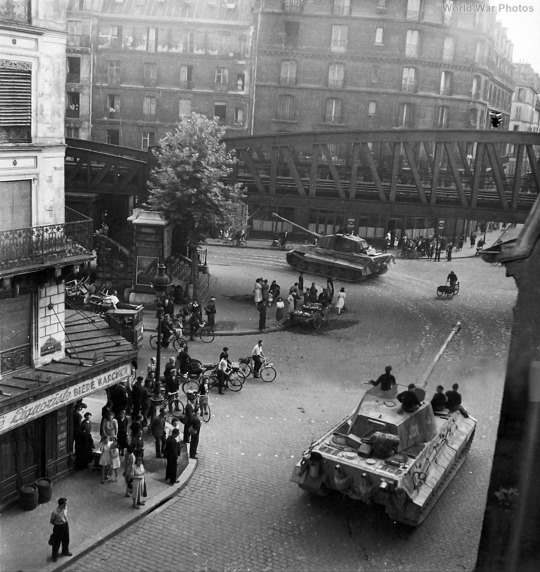
Chars Tigre Royal de la 3e compagnie du 503e Bataillon de chars lourds venant de la rue d'Aubervilliers et se dirigeant vers le Boulevard de la Villette – Paris – Août 1944.
Photo via https://www.worldwarphotos.info/
#WWII#Occupation de la France#France occupée#Occupation of France#Occupied France#Armée allemande#German Army#Wehrmacht#Heer#503e Bataillon de chars lourds#503rd Heavy Panzer Battalion#Char#Tanks#Char lourd#Heavy tank#Panzerkampfwagen VI#Panzer VI#Tigre II#Tigre Royal#Paris#08/1944#1944
21 notes
·
View notes
Text
Jeunesse et montagne
"In 1942, a French army captain proudly related a recent mountaineering expedition he had led. Recalling Pétain’s desire to maintain the virility of French soldiers, the captain felt justified in dragging his men up to the summits. After an ascent of 3146 m he proudly surveyed his men; ‘Ah . . . the solid, muscular thighs of my soldiers! Beautiful bronzed arms emerging from shirt sleeves! Fine, sunburnt faces smiling through the sweat!’ For the captain, this arduous ascent had brought physical and moral benefits; the ‘mountain is one of the new ways to give the soldier a more virile soul, a better placed heart (un coeur mieux placé), and a more robust body.’ According to geographer Rachel Woodward, the natural environment is crucial for constructing and expressing masculine identities, and so forms a key part of military training. This seems to have been the case for the jubilant captain and the armistice army in general, which used mountain training to instil the importance of teamwork, risk and morality into its soldiers.
The French Air Force deployed mountains to achieve similar aims through its youth movement, Jeunesse et Montagne (Youth and Mountain). Created on 2 August 1940, Jeunesse et Montagne aimed to utilise the mountain environment to transform its 15,000 draftees (aged between 18 and 20 years) into a virile elite dedicated to the resurrection of France. In many ways Jeunesse et Montagne was similar to other Vichy-approved youth groups, as it sought to regiment and revitalise young men, and indoctrinate them with a strong sense of honour, duty, discipline and a respect for hierarchy. Yet there were key differences. In particular, Jeunesse et Montagne had a relatively small membership compared with other youth movements in Vichy France. It was also harder to enter Jeunesse et Montagne than Chantiers de la Jeunesse (draftees had to be physically fitter), and such exclusivity appears to have been part of the appeal for the organisation’s leadership. In the words of Maurice Bongard, head of the Pyrenean ‘Vignemale’ groupement, Jeunesse et Montagne would create an ‘elite of strong and daring men’ dedicated ‘joyfully and entirely to the cause of national resurrection’. Once again in Vichy France, mountains were associated with elitism.
Another key difference was Jeunesse et Montagne’s emphasis on altitude; mountains were training grounds for France’s new elite and a substitute for the skies. Its leadership informed recruits in August 1940 that Jeunesse et Montagne would be a ‘tough and simple means to keep intact, even improve, each day your souls and your bodies and preserve whole the flame of youth that has irresistibly attracted you towards the skies’. Training and activities reinforced the importance placed on altitude. These included Alpine sports and aeronautical activities during a period of training in high-altitude chalets in the Alps and Pyrenees.
This time spent in the mountains was to be educational and alpinism the ‘hard and beautiful school of man’. For Bongard, the mountain was a ‘tough school’ in which to ‘complete the physical, moral, and civic education of a selection of young French men’. Physically, the sheer effort of living at high altitude would serve to ‘develop muscles’, the ‘pure air’ was to ‘invigorate the blood’ and the toughness of life was designed to ‘strengthen the body and harden it against fatigue, cold, and pain’. Morally, the mountain would push the young men to ‘constantly surpass themselves’ and make them ‘love risk and effort’. And socially, mountain life mitigated against individualism and transcended class barriers, obliging Jeunesse et Montagne recruits to ‘live as a team, walk in line, and climb in roped teams’.
The transformative influence of mountains on male bodies was a central component of Jeunesse et Montagne’s philosophy. According to the organisation’s medical service, the mountain climate and high altitude improved respiration, circulation and metabolism, as well as increasing appetites and destroying almost all types of air-born germs. Skiing developed muscles, coordination and respiration, while alpinism had an even more beneficial effect on the body as it reportedly developed ‘equilibration, muscle tone, and heightened senses’. After 6–8 months, it was predicted that a Jeunesse et Montagne recruit would gain 4–6 kilos in weight, demonstrate heightened reflexes and decision-making capabilities, and enjoy a greater vital capacity. As an aesthetic benefit, brown skin pigmentation would ‘happily replace the “corpse-like” white skin of new arrivals’. That living in nature without comfort, taking cold showers and going bare-chested led to a ‘hardening of the body’ was taken as being almost self-evident.
In addition to becoming bronzed, stronger and more dynamic, alpinism would allow the young men to gain better self-knowledge of their own bodies. As Charles Roiron, Jeunesse et Montagne’s head of sporting activities, informed its unit leaders, every physical movement was crucial in the mountains and the alpinist needed to be acutely aware of his own weight and exert complete control over his muscles; ‘because it forces us to be aware of each one of our muscles, the mountain makes us rediscover ourselves (retrouver nous-mêmes). It is the best remedy for the malaise of modern man, which the experts rightly attribute to man’s ignorance of his body.’
The manual labour that Jeunesse et Montagne conducted was also designed to contribute to the physical and moral renewal of the young men. In line with the National Revolution’s propaganda, work was represented as a unifying activity that broke through artificial class divisions and which contributed to France’s national recovery. Jeunesse et Montagne’s work was diverse and included physically exacting timber felling on vertiginous mountain slopes. The assigned logging sites were frequently located ‘high up on abrupt slopes’ where the evacuation of wood was ‘often acrobatic’. Despite its dangers and difficulties, the mountain-based lumberjacks were reported to enjoy forestry work because they learnt new skills, shared their experience with their comrades, discovered the forest (a seductive and somewhat mysterious universe) and developed their physical strength.
...
[Contrary to the propaganda] ... the notebooks of some units suggest that the young men’s lives were dominated by forestry work, fatigue and thoughts of food (punctuated by skiing lessons) rather than a sense of testing themselves against the mountain or becoming new men. Lionel Therray, who went on to become one of France’s most celebrated mountaineers, remembers the tough Jeunesse et Montagne lifestyle which was tempered by the ‘atmosphere of good humour, gusto (entrain), camaraderie, [and] enthusiasm’. Such was the feeling of ‘collective exaltation and exhausting work’ that Therray experienced ‘some of the most intense and totally happy days imaginable’. While this life equipped Therray with endurance skills that proved useful in later life, others, he believed, suffered physically from the punishing regime. Consequently, an experience that was received initially in an enthusiastic manner descended into a ‘sort of hell’. Therray’s experience indicates that Vichy’s attempt to rebuild masculinity in the mountains was somewhat problematic. This reflects wider problems with the regime’s attempts to rebuild French manhood, and many historians contend that it was only during Liberation that French masculinity was restored, through such practices as shaving the heads of female collaborators.
More specifically, like many other Vichy-sponsored initiatives, the aims of Jeunesse et Montagne were ultimately diluted by wartime exigencies. Not least, German labour demands meant that many recruits left the mountains to work in factories on the plains below. As well as fulfilling labour requirements, this movement to the plains alleviated other German concerns. The German authorities had long been suspicious of French youth groups carrying out mountain-based activities. Hinting at possible military activity, one German memorandum asked, ‘by giving instruction in skiing will not other interests other than sporting ones be pursued?’ In the end, German authorities demanded the dissolution of Jeunesse et Montagne units in January 1944, which were transformed into industrial labour units. The notion of a healthy and uplifting life in the mountains that would create a new French elite dissolved into the everyday realities of industrial labour."
- Chris Pearson, Scarred Landscapes: War and Nature in Vichy France. New York: Palgrave MacMillan, 2008. p. 102-104, 106-107
#world war ii#occupied france#vichy france#alpinisme#german occupation of france#mountain climbing#armée de l'air#environmental history#histoire de france#research quote#reading 2024#national revolution#rebuilding bodies#history of masculinities#hard bodies
1 note
·
View note
Text

Russell over here like can I PLEASEEEEE infiltrate armand's coven PLEASE!
and he's all stirred up because in the vampire lestat they haven't met a vampire that's over 300 years old and he's like

"I have arrived"
#Russell in an Anne rice verse would be the ABSOLUTE fucking worst#all these vamps thinking lestat is awful ... nah#also he gets so aggravated with the religion and vampire god stuff#catch him jumping on stage to talk LOUD AF with a german accent in post occupied France#and talking down to armand and the other vampires about their little rules#okay I'm done Russell has just woken up and he's ready to fuck some shit up#and apparently it's directed at this tiny French theater of vampires XD
1 note
·
View note
Text
The Age of Louis XIV

Voltaire, who wrote Le sciècle de Louis XIV (The Age of Louis XIV), started off by doing a recount of the states of Europe before Louis XIV. and my hetalia brain rot began to go wild so i figure this can help me understand the first chapter of the book better so I sorted out quotes and made a brief summary for each mentioned nation in order that is written in the book to help enforce my understanding.
Germany*
*- "Germany" refers to the Empire of Germany, known in history as the Holy Roman Empire; since the 15th century, its throne had been occupied by the Habsburgs

"...the most powerful neighbor which France has...it abounds more with sturdy men inured to labor." "this great Germanic body...is maintained in [... ] order and regularity [...] The difference of government and genius makes...the Germans [more proper] for acting on the defensive."
Summary: strong, divided into two parties by Christianity. Emperor has less power in compare to a King in France. Was at the time pretty poor despite being "rich at home", and would eventually see its flourishing later on.
Spain
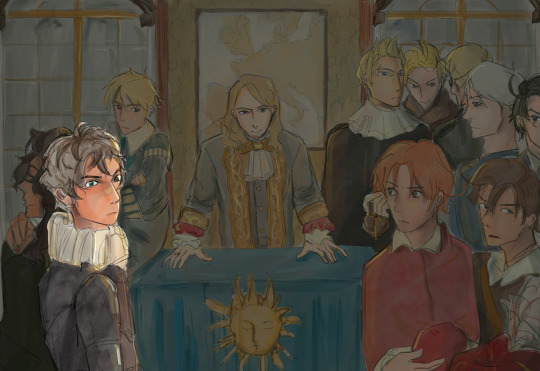
"...more formidable to Europe than the Germanic Empire. The kings of Spain were infinitely more absolute and rich than emperors..." "[Spain] under Philip II became a vast body without substance, which had more reputation than real strength...Notwithstanding all these disadvantages, Spain, by being united to the empire, threw a very formidable weight into the balance of Europe."
Summary: strong #2, starting to see its weak points, but still a ringing force and surviving well with the colonies.
Portugal
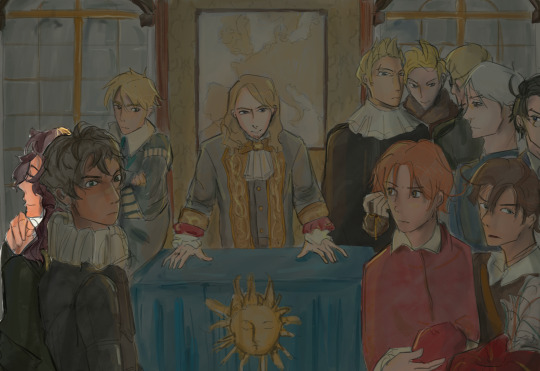
"...Portugal was again made a kingdom...through necessity, cultivated trades...entered into a league with the French and Dutch against Spain." "Portugal...extended its trade, and augmented its power..."
Summary: doing well over there. Shall watch your career with great interest.
The United Provinces
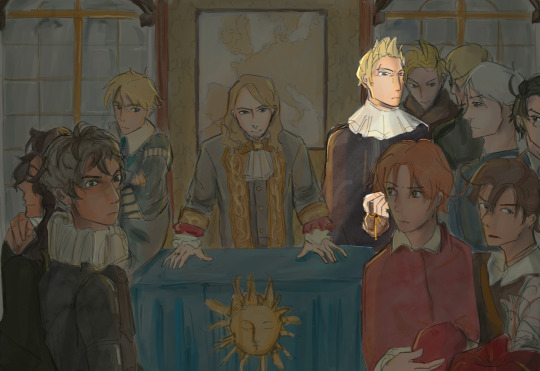
"...almost the only example in the world of what may be done by the love of liberty and unwearied labor. There poor people...made head against the whole collected force of their master and tyrant...and founded a power which we have seen counterbalancing that of Spain itself." "...they established a form of government which preserves...equality, the most natural right of human kind."
Summary: quite an admirable force (don't mess with the Dutch's money bags™️). Good government.
England
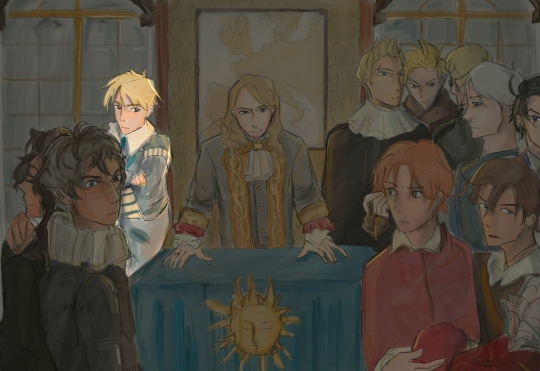
"England...arrogated to itself the sovereignty of the seas, and pretended to preserve a balance between the powers of Europe." "This civil war...[made England] lost [...] credit in Europe...trade was obstructed, and other nations looked upon [England]...till the time that she at once became more formidable than ever, under the rule of Cromwell."
Summary: pirate arc of England sprouting. Charles I could do well in anything but being a king ("ill-advised prince"). Waiting for Cromwell to do his thing.
Rome/The rest of Italy
I merged these two parts together for ✨aesthetics✨
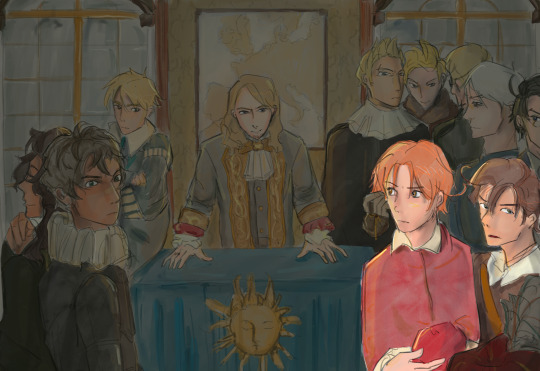
"[Rome] has very little trade or money. [Rome's] spiritual authority...is slighted and abhorred by one half of Christendom...yet [...] some [...] resist [Rome's] will at times with reason and success." "but [the privileges] of Rome, by an almost constant proper use of resolution and concession, has preserved all that was humanly possible for her to preserve." "Some rights, many pretensions, patience and politics are all that Rome has left now of that ancient power..."
Summary: typical pope behavior, but in reality was losing respect and control. Impressively that was dealt with seasoned insight, and different oppositions of different kings/emperors were met with different levels of defense ("submissive...terrible to..acting cunningly"). Sly old fox, if you will.
"...situated in a peaceble country...biassed by various interests." "The state of Florence enjoyed tranquility and abundance under [...] Medici; and literature, arts, and politeness [...] still flourished there."
Summary: the typical Renaissance still doing the thing. Less disturbed by conflicts compared to the northern parts.
The Northern Kingdoms
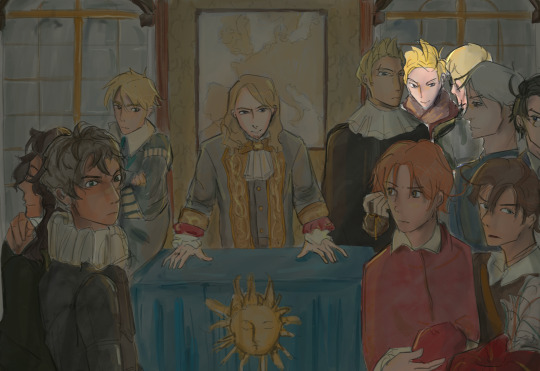
"The Swedes [...] were a freer nation by their constitution which admits even the lowest class of the people into the assembly of the general estates." "Denmark...was no longer so [formidable] to any power."
Summary: Sweden good. Denmark flopping a bit. The rest of the northern kingdoms were doing their best (fighting)
The Turks

"The seraglio, though corrupted by effeminacy, still retained its cruelty...when it had [recovered from wars], this empire became again formidable."
Summary: may look messy back home but still don't underestimate the power
The situation of France

"France [...] was in alliance with Sweden, Holland, Savoy and Portugal...was engaged in a war against the empire of Spain...The French there has done the Spaniards and Germans a great deal of mischief, and had suffered as much themselves."
Summary: fighting with Spain (and also the house of Austria, so also Germany), tho the battles has reduced to petty squabbles over "a few frontier towns". Richelieu came to raise tax.
---
Works cited The Works of Voltaire. A Contemporary Version. A Critique and Biography by John Morley, notes by Tobias Smollett, trans. William F. Fleming (New York: E.R. DuMont, 1901). In 21 vols. Vol. XII.
--- Rambling (just a little) time.
Okay first off, bear in mind that all the quotes and summarized content are from the pov of Voltaire, so there can be possible biases.
I've been invested in the reign of Louis XIV for quite a while now, and I can attribute the reasons to 1) BBC Versailles, 2) Molière, and 3) general liking to history at the time (17-18c). I'm trying to figure out what exactly that the time period attracted me so much, like what "vibe" what "ideal" etc, but I'm still trying. And reading that book, which is long as hell, not to mention the messy af™️ European drama and people having Too Similar Names may just be helpful in terms of getting to know the history that happened in and around the court of Louis XIV.
Welp, gotta read more if I want to know more.
#hetalia#aph#historical hetalia#i will be lazy and not tag everyone sorry not sorry#doodle dump#random otter rattles#history
177 notes
·
View notes
Text
funny/interesting anecdotes from parachute infantry:
web's head was shaved for the normandy jump
web slamming the entire package of air sickness pills in an attempt to completely numb himself from what was going on on d-day
the whole spiel about how colonel sink didn't want any of the paratroopers to be caught dead wearing these woollen hats without their helmets on because it was undignified for whatever reason and the generals would ream him about it. and web being like we're jumping into german-occupied france why are you talking about what hats we can't wear
web getting transferred from hq company because he was bored and wanted to see more action but then of course complaining every time he was in combat
the entire saga of web's hatred for lieutenant peacock. in holland, peacock made web sweep out his quarters while the enlisted men slept outside in holes. web then proceeds to dream about beating peacock with a broom/fantasize about shooting him
also: web saying the only thing him and peacock ever had in common was diarrhea
in hagenau, johnny martin almost got web and a few others killed when he called in an artillery strike way too close to the house they were holed up in and they nearly got blown up
just so much alcohol consumption. luz driving like a maniac and web raiding the berghof's cellar in berchtesgaden. web being disappointed that all hitler had was wine and champagne and no hard liquour
web being really drunk when grant was shot and barely making it out to the road to guard it in case the offending replacement showed up
the whole saga with speirs' mercedes. speirs confiscated this german car in austria but then colonel strayer wanted the car so speirs proceeded to shoot out the windshield then drive the thing off a cliff (he bailed just in time)
web being super drunk in front of speirs and embarrassing himself. then being a complete mess during ceremonial retreat and getting yelled at
stealing like 50 bottles of german gin from some factory
showing up at regimental headquarters to see about his points muddy and soaked from the rain and getting scolded by colonel sink (who he was dreaming about meeting one-on-one the entire war) for wearing fatigues in the building
there's probably more i've forgotten but boy what a book
296 notes
·
View notes
Text
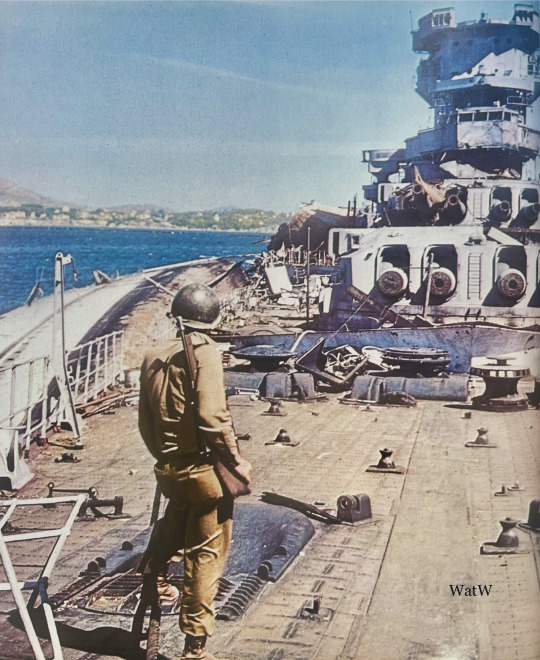
A US soldier surveys the deck of one of the two French battle-cruisers in Toulon - 1944. Both the Strasbourg and the Dunkerque had been scuttled when German forces occupied southern France in Nov 1942
#world war two#ww2#worldwar2photos#history#1940s#ww2 history#wwii#world war 2#ww2history#wwii era#dunkerque#1944#strasbourg#usarmy#us army#us armed forces#battle cruiser#scuttle#France#Toulon
287 notes
·
View notes
Text




























Замок Миранда (Château Miranda)— замок 19-го века построенный в нео-готическом стиле в городе Сель, провинция Намюр, Бельгия. Строительство замка началось в 1866 году по проекту английского архитектора Эдварда Милнера. Замок был задуман как летняя резиденция семьи Liedekerke De Beaufort. Однако архитектор скончался до окончания постройки и замок достраивался уже без него. Окончание строительства произошло в 1907 году.Потомки старинного рода проживали там до Второй Мировой войны. Во время войны замок был оккупирован немецкими войсками.После войны владельцы решили перебраться во Францию, а их роскошный замок превратился сначала в детский дом, а с 1958 года - в дом отдыха для детей железнодорожников. Видимо, тогда он и получил свое второе название Chateau de Noisy (Шумный замок).
С 1991 года Миранда был заброшен, расходы на его содержание оказались непомерно высоки. Местный муниципалитет предложил взять их на себя, но семья отказалась, надеясь найти покупателя.Параллельно с поисками покупателя владельцем была подана просьба о сносе здания, в июле 2015 оно было получено. Средства на восстановление заброшенного замка требовались колоссальные, было организовано товарищество по спасению Миранды, но речь шла о сумме в 15-25 миллионов евро.Два года спустя покупатель так и не был найден, а отдать свой замок в дар государству не каждый способен...
"Замок превратился в руины и представляет собой реальную опасность для всех тех, кто незаконно вторгается в мою частную собственность" - так владелец объяснил уничтожение Miranda Castle.
Château Miranda is a 19th-century castle built in the neo-Gothic style in the town of Sel, Namur, Belgium. Construction of the castle began in 1866 according to the design of the English architect Edward Milner. The castle was conceived as the summer residence of the Liedekerke De Beaufort family. However, the architect died before the construction was completed and the castle was completed without him. The construction was completed in 1907. Descendants of the old family lived there until the Second World War. During the war, the castle was occupied by German troops. After the war, the owners decided to move to France, and their luxurious castle turned first into an orphanage, and since 1958 into a holiday home for children of railway workers. Apparently, it was then that it received its second name, Chateau de Noisy (Noisy Castle).
Since 1991, Miranda has been abandoned, the costs of its maintenance being prohibitive. The local municipality offered to take them over, but the family refused, hoping to find a buyer. In parallel with the search for a buyer, the owner submitted a request to demolish the building, which was received in July 2015. Colossal funds were required to restore the abandoned castle; a partnership was organized to save Miranda, but the amount in question was 15-25 million euros. Two years later, a buyer was never found, and not everyone is able to donate their castle to the state…
“The castle has turned into ruins and poses a real danger to all those who illegally invade my private property,” this is how the owner explained the destruction of Miranda Castle.
Источник:/poshyk.info/zabroshennye-zamki-mira/,/fishki.net/50746-zabroshennyj-zamok-chateau-miranda-52-foto.html,//dzen.ru/ a/ YWAhiQydDxQdRome,/steport.com/article/23/zabroshennyi-zamok-chateau-miranda,/pikabu.ru/story /zabroshennyiy_zamok _chateau _ miranda_gorod_sel_provintsiya_namyur_belgiya_5540122,/vk.com/album-43797049_205839158.
#Бельгия#история#заброшенные места#Заброшенное#Замок Миранда#архитектура#Неоготика#фотография#Belgium#history#abandoned#Architecture#Château Miranda#castle#Miranda Castle#Noisy Castle#neo-Gothic style#abandonedplaces#abandonedbuilding#abandoned photography#photography#lost in time
172 notes
·
View notes
Text
Have you noticed how almost everything that the anti-Israel crowd accuses people who simply recognize Israel's right to exist of, is (in additional to usually being false) stuff they're guilty of themselves?

"You support ethnic cleansing!"
What do you think it means, when you chant the English translation of "From water to water, Palestine will be Arab"?
"You support an ethno-state!"
Do you call for the destruction of every single nation state, such as Germany, Japan, France, and so on? No? Then so do you. Have you called for the establishment of a Palestinian state? Then, so do you. Between Hamas ruling Gaza and being genocidal when it comes to Jews, and Mahmoud Abbas (president of the Palestinian Authority) stating no Israelis will be allowed in the State of Palestine (and by "Israelis" we all know he doesn't mean the Arab citizens of Israel, he's talking about Jews) that's going to be an ethno-state, too. Oh, you meant a "pure" ethno-state. Those don't exist in today's reality, and Israel, with 27% of its citizens being non-Jews, is no exception.
"Oct 7 didn't happen in a vacuum, you're ignoring the context of the past 75 years!"
You are ignoring big chunks of anti-Jewish violence during these 75 years, you're ignoring the expulsion of almost 900,000 Jews from Arab and Muslim countries, you're ignoring the anti-Jewish violence and persecution that preceded the establishment of the Land of Israel, and you're ignoring all 3,500 years (at least) of Jewish existence in and connection to our ancestral homeland, Israel.
"You support collective punishment!"
The same way you do, when you chant, "When people are occupied, resistance is justified"? Because that's what it means, that for the sin of Israel supposedly being a colonial state (a false claim, since Jews are native to Israel), you're justifying raping 13 year old girls, shooting them in the head, murdering Holocaust survivors, burning babies alive... what's that if not supporting collective punishment? (that's before we get into the fact that Israel not surrendering in a war started by Hamas is NOT collective punishment, or else we would have to define the allies not surrendering to the Nazis in WWII as collective punishment of the Germans)
"You suppor apartheid!"
All Israeli citizens have the same civil rights. Apartheid in South Africa was a system where citizens of the country had their rights limited based on skin color/ancestry. The issue in South Africa wasn't that racism existed (IDK a single country where racism doesn't), it's that it was codified into law, and used against the rights of that country's own citizens. Israeli Jews and Israeli Arabs have the same rights. Non-Israeli Palestinians not having the same rights as Israelis, including as Israeli Arabs, is the same as French Canadians not having the same rights in the US as French Americans. It is NOT proof the US is applying a system of apartheid unto French people. And if it were, then I have news for you, every country applies different rights to citizens vs not citizens, so every country would be an apartheid state by this criterion. Which would make the word meaningless, and it would diminish the suffering of non-whites under South Africa's apartheid (as some young black South Africans who have actually been to Israel now point out). Meanwhile, I'll point back up to where Mahmoud Abbas said no Israelis (i.e Jews) will be allowed in Palestine, and that under the Palestinian Authority, a Palestinian can be jailed or executed for selling land to Jews, which means the PA demolishes the right to property (of Jews to own it, and of the PA's Palestinian citizens to sell it as they see fit) based solely on the ancestry of the buyer... And you support the PA, right?
"You deny the Nakba!"
I had never encountered any Israeli denying that roughly 850,000 Arabs fled Israel due to the War of Independence. Pointing out that the Arabs are the ones who started that war isn't the same as denying it happened. Meanwhile, the people who make this accusation, largely deny the expulsion of the Jews from Arab and Muslim countries, deny the suffering, discrimination, expulsions and massacres Jews had endured for centuries under Arab and Muslim regimes, and deny the atrocities of Oct 7.
"You support colonialism!"
Say the people who deny the native rights of the Jews, who act as if these rights are limited by time (as if such a limitation benefits anyone other than actual colonizers), who ignore the fact that Palestinians wouldn't exist here without Arab colonialism, or who wish to confer a native status unto them by virtue of... being settler colonialists for a "long time" (to be clear, the way the UN's definition of a Palestinian refugee works, it only requires a person to have been an Arab* settler colonialist in Israel during the 2 years prior to the founding of the Israeli state, to be recognized as a Palestinian. To become a US citizen, in addition to other requirements, you have to live in the US for at least 5 years, 3 if married to an American citizen. That means in June of 1946, it was easier to become a Palestinian "native" in the eyes of the UN, than an American citizen). Don't get me wrong, Palestinians have a right to live in the place where they were born. I can both recognize that they're here due to Arab colonialism, AND be okay with them living here. Just like I can recognize that no Americans today deserve to be displaced, even though the majority of them are there thanks to colonialism. And I don't have to pretend like Americans of European descent have suddenly become native (something that if I did, would probably hurt actual Native Americans), in order to recognize their right to live where they were born. It's just ironic that if we took the logic of the anti-Israel crowd when it comes to native Jews, and applied it to all native peoples, this would harm the natives, erase their rights, recognize their colonizers as natives, and generally help colonialism.
There's probably more, but I think this is demonstrative enough.
* Technically, the UN didn't specify ancestry. As an idea, you could be Arab, Jewish, a Polish Catholic priest living in a convent in the Land of Israel from Jun '46 to May '48, and you'd be recognized as a Palestinian by the UN, but in reality this definition ended up favoring all non-Jewish colonizers of the land. In 1952, Israel said, "It's okay, we'll take care of the Jewish refugees displaced by the War of Independence. No need for the UN to do so. This is what we set up a Jewish state for." This is in addition to Israel taking care of the Jewish refugees from Arab and Muslim countries, and Jewish Holocaust survivors. And for Israel's show of responsibility, the now-Israeli Jewish refugees have been punished. They don't get recognized as existing, as having been displaced by, and having suffered due to the war the Arabs started in the Land of Israel against its Jewish communities. "Palestinian" refers to non-Jews only from the second The British Mandate in Palestine's Jews became Israeli Jews, but that doesn't stop the anti-Israel crowd from falsely claiming there are Palestinian Jews today... even though since May of 1948, there aren't, and before that, those Palestinian Jews were British subjects, not the citizens of an Arab independent state called Palestine (something that has never historically existed). Thanks to the exclusion in practice of Jews from the definition of Palestinian refugee, the UN agency for taking care of Palestinian refugees, UNRWA became a tool of spreading anti-Jewish hate.
(for all of my updates and ask replies regarding Israel, click here)
#israel#antisemitism#israeli#israel news#israel under attack#israel under fire#israelunderattack#terrorism#anti terrorism#hamas#antisemitic#antisemites#jews#jew#judaism#jumblr#frumblr#jewish#resources
782 notes
·
View notes
Text
Today's Black History Month illustration is of Josephine Baker. She was a world famous entertainer, WWII spy, and activist.
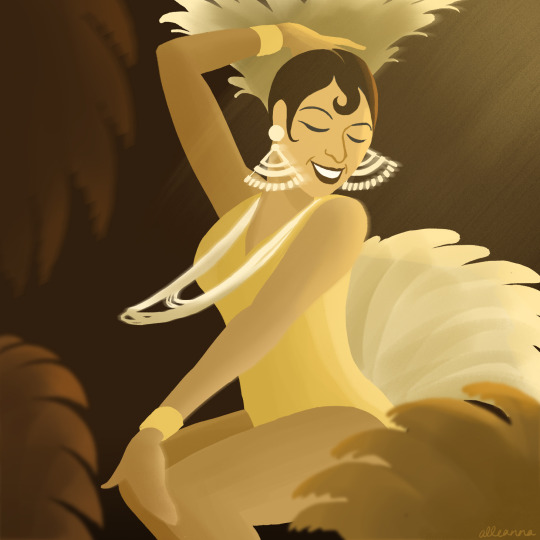
Freda Josephine McDonald was born in St. Louis, Missouri in 1906. Her parents were both vaudeville performers, but Baker would have to take on odd jobs to help support her family.

At the age of 15, she ran off and joined a dance troupe from Philadelphia. She also got married, took her husband’s last name, dropped her first name and started going by the name Josephine Baker. After acting and dancing in musicals, she moved to New York City and was soon performing at the Plantation Club where she became a crowd favorite.
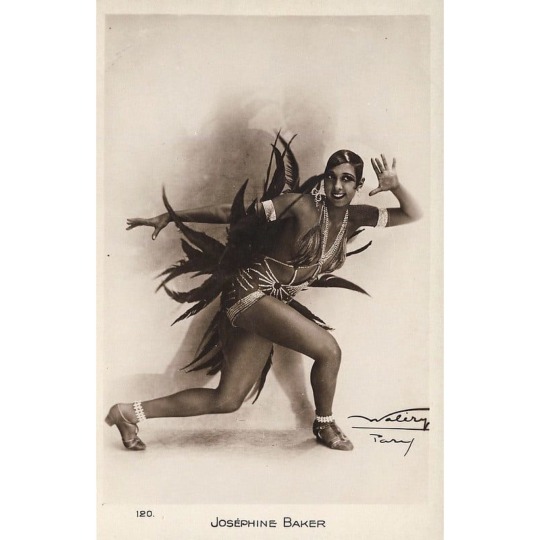
In 1925, Baker went to Paris to dance at the Théâtre des Champs-Élysées in La Revue Nègre. When the Revue closed, she was given her own show and her career skyrocketed.
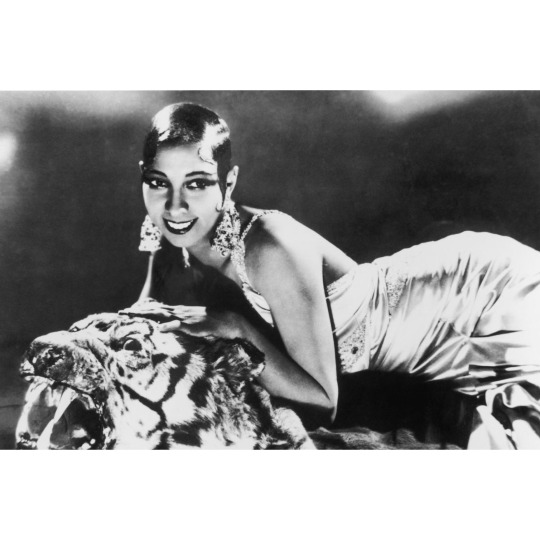
She was the first Black woman to star in a motion picture and one of the first Black entertainers to achieve acclaim on screen and stage.
Baker became a citizen of France in 1937. When the Germans occupied France during WWII, she worked with the Red Cross and the French Resistance by transporting confidential information by writing with invisible ink on her sheet music. She was awarded the Croix de Guerre and the Legion of Honor with the rosette of the Résistance.
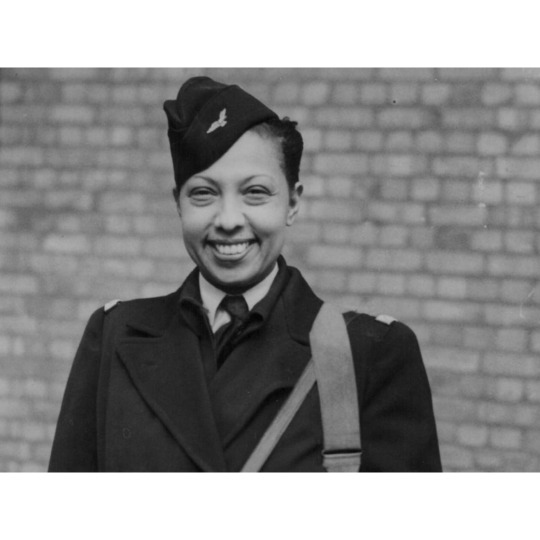
Baker traveled many times to the US to participate in the civil rights movement. She was the only woman who spoke at the March on Washington for Jobs and Freedom in 1968.
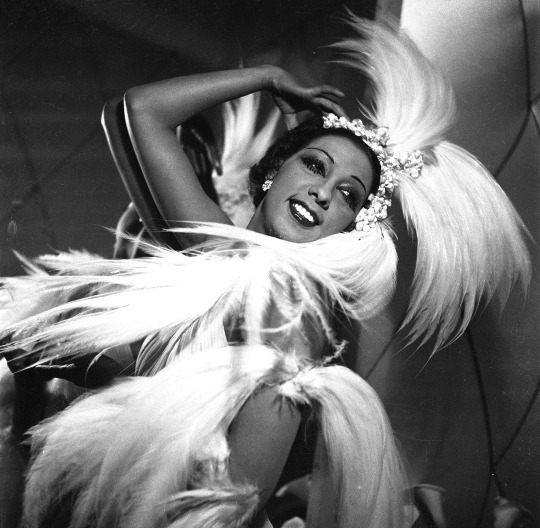
Her time at home forced her to confront segregation and discrimination that she didn’t experience overseas. She often refused to perform for segregated audiences and club owners were forced to integrate for her shows.
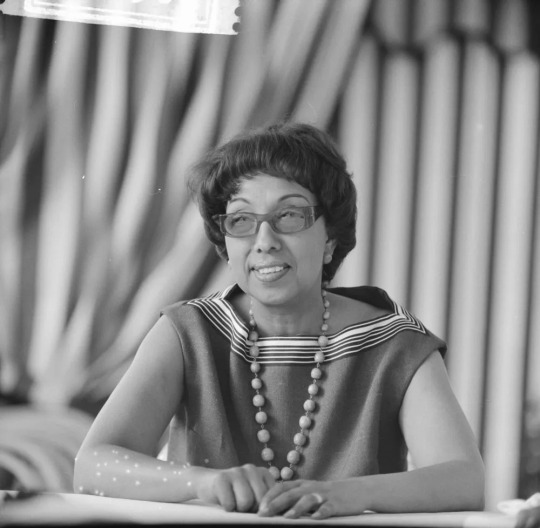
She continued to perform until her death in 1975, during the celebration of the 50th anniversary of her Paris debut.
I’ll be back on Monday with the last illustration and story!
#josephine baker#black history facts#black history month#black history 365#artists on tumblr#illustrators on tumblr
2K notes
·
View notes
Text
TF2 in Historical Context: Spy's Background
It goes without saying that Spy is incredibly mysterious and we know fuck all about him, other than that he at some point had an affair with Scout's mother, and Scout was the product of that. However, I think we can extrapolate some stuff about his backstory nonetheless

Firstly, we learn in Comic 6, which takes place in 1972, that Scout is 26-27 years old. This puts his birth year at 1945 or 1946, right after the end of WWII. I say '26' bc uh. Babies gotta grow yk
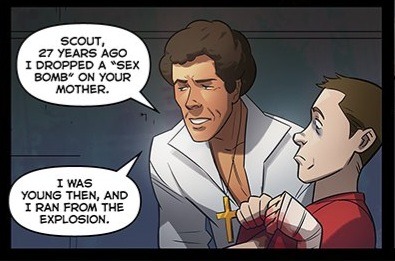
This puts Spy's latest possible birth year at around 1927. Probably a little (but not much) earlier, for reasons we'll get into. It is fair to assume that Spy was already a spy by the time he met Ma, because there's no other reason for him to have been in Boston in 1945 really


I can't be the only one who was kinda surprised that Spy looks much younger than I expected without his mask - he's less noticeaby greying than Heavy and Medic too. He's either got an insane botox routine (which wouldn't be ooc lol), or he's younger than the two of them.
In my last post I concluded Heavy was around 52 in 1972, and 59 in 1979. If Spy is slightly younger, that would make him in his mid 40s in game, late 40s in Comic 6 and early to mid 50s in Comic 7.
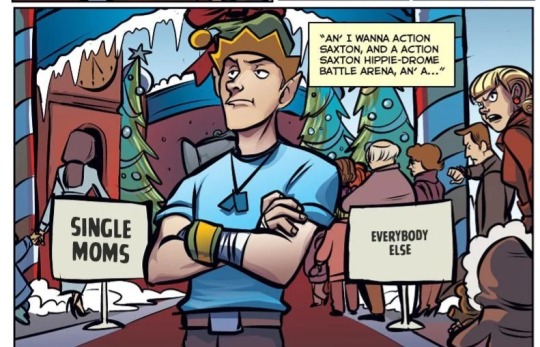
So. Given Scout is 27, that means that Spy would have met Ma when he was in his early 20s. On a related note, given she already had 6 children before they met, she's also probably quite a bit older than him lol. Seems like both he and Scout have a thing for Moms
All this to say, I think 1924ish is a good approximate birth year for Spy. This would make him 15 years old when WWII broke out and just 16 when Germany invaded France in 1940.
Onto historical context: France was the first modern nation in Western Europe to introduce universal military conscription, which wasn't phased out until 2001. Conscription did take place during WWII (and WWI), but Spy was almost definitely too young to be drafted.
We don't know which region of France Spy is from, so we don't know whether he grew up in the zone libre, which was free from Nazi occupation, or in Vichy France, the puppet state headed by Maréchal Philippe Pétain established by the German occupying force.
Given Spy's age and the context of the Nazi occupation of France, I think it's most likely he entered the world of espionage by joining the French Resistance. Resistance fighters were highly diverse and came from different sections of society, but young people were esp useful.
After the war, a national myth arose in France that overplayed the size and breadth of the Resistance forces, whilst underplaying or ignoring the degree of collaboration of some parts of the country with the Nazi occupation. This came to be known as Résistancialisme.
Something I always think about with the European mercs is the question of how they ended up in the USA in the first place. Given Scout was born around ~1945, Spy must have left France after it was liberated in September 1944.
I feel like if Spy were a member of the Resistance, this shift in the collective memory of the resistance in France may have been one of the reasons he left the country. Either that or he found himself good at working undercover and fell into working internationally.
73 notes
·
View notes
Text
D-Day was 80 years ago today!
D-Day was the first day of Operation Overlord, the Allied attack on German-occupied Western Europe, which began on the beaches of Normandy, France, on 6 June 1944. Primarily US, British, and Canadian troops, with naval and air support, attacked five beaches, landing some 135,000 men in a day widely considered to have changed history.
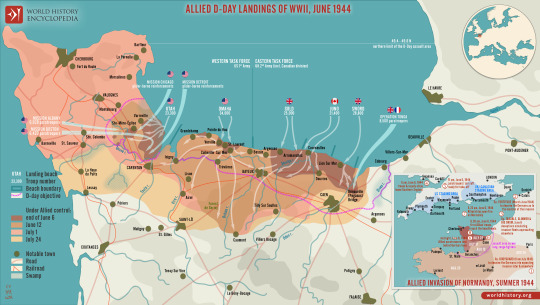
Where to Attack?
Operation Overlord, which sought to attack occupied Europe starting with an amphibious landing in northwest France, Belgium, or the Netherlands, had been in the planning since January 1943 when Allied leaders agreed to the build-up of British and US troops in Britain. The Allies were unsure where exactly to land, but the requirements were simple: as short a sea crossing as possible and within range of Allied fighter cover. A third requirement was to have a major port nearby, which could be captured and used to land further troops and equipment. The best fit seemed to be Normandy with its flat beaches and port of Cherbourg.
The Atlantic Wall
The leader of Nazi Germany, Adolf Hitler (1889-1945), called his western line of defences the Atlantic Wall. It had gaps but presented an impressive string of fortifications along the coast from Spain to the Netherlands. Construction of gun batteries, bunker networks, and observation posts began as early as 1942.
Many of the German divisions were not crack troops but inexperienced soldiers, who were spending more time building defences than in vital military training. There was a woeful lack of materials for Hitler's dream of the Atlantic Wall, really something of a Swiss cheese, with some strong areas, but many holes. The German army was not provided with sufficient mines, explosives, concrete, or labourers to better protect the coastline. At least one-third of gun positions still had no casement protection. Many installations were not bomb-proof. Another serious weakness was naval and air support. The navy had a mere 4 destroyers available and 39 E-boats while the Luftwaffe's (German Air Force's) contribution was equally paltry with only 319 planes operating in the skies when the invasion took place (rising to 1,000) in the second week.
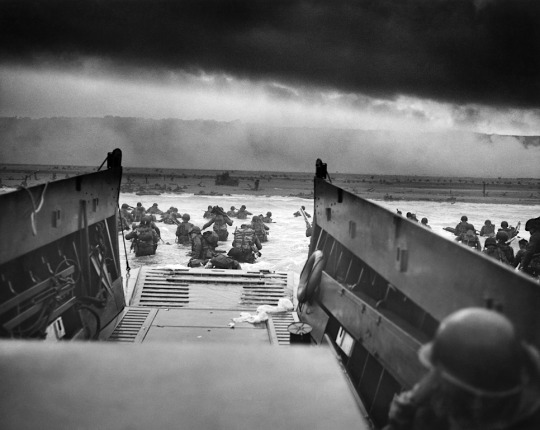
Neptune to Normandy
Preparation for Overlord occurred right through April and May of 1940 when the Royal Air Force (RAF) and United States Air Force (USAAF) relentlessly bombed communications and transportation systems in France as well as coastal defences, airfields, industrial targets, and military installations. In total, over 200,000 missions were conducted to weaken as much as possible the Nazi defences ready for the infantry troops about to be involved in the largest troop movement in history. The French Resistance also played their part in preparing the way by blowing up train lines and communication systems that would ensure the defenders could not effectively respond to the invasion.
The Allied fleet of 7,000 vessels of all kinds departed from English south-coast ports such as Falmouth, Plymouth, Poole, Portsmouth, Newhaven, and Harwich. In an operation code-named Neptune, the ships gathered off Portsmouth in a zone called 'Piccadilly Circus' after the busy London road junction, and then made their way to Normandy and the assault areas. At the same time, gliders and planes flew to the Cherbourg peninsula in the west and Ouistreham on the eastern edge of the planned landing. Paratroopers of the 82nd and 101st US Airborne Division attacked in the west to try and cut off Cherbourg. At the eastern extremity of the operation, paratroopers of the 6th British Airborne Division aimed to secure Pegasus Bridge over the Caen Canal. Other tasks of the paratrooper and glider units were to destroy bridges to impede the enemy, hold others necessary for the invasion to progress, destroy gun emplacements, secure the beach exits, and protect the invasion's flanks.
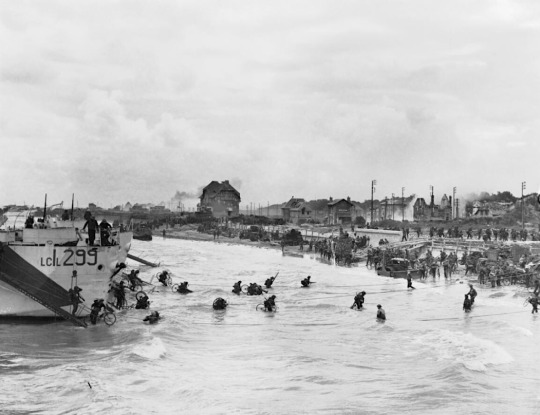
The Beaches
The amphibious attack was set for dawn on 5 June, daylight being a requirement for the necessary air and naval support. Bad weather led to a postponement of 24 hours. Shortly after midnight, the first waves of 23,000 British and American paratroopers landed in France. US paratroopers who dropped near Ste-Mère-Église ensured this was the first French town to be liberated. From 3.00 a.m., air and naval bombardment of the Normandy coast began, letting up just 15 minutes before the first infantry troops landed on the beaches at 6.30 a.m.
The beaches selected for the landings were divided into zones, each given a code name. US troops attacked two, the British army another two, and the Canadian force the fifth. These beaches and the troops assigned to them were (west to east):
Utah Beach - 4th US Infantry Division, 7th US Corps (1st US Army commanded by Lieutenant General Omar N. Bradley)
Omaha Beach - 1st US Infantry Division, 5th US Corps (1st US Army)
Gold Beach - 50th British Infantry Division, 30th British Corps (2nd British Army commanded by Lieutenant-General Miles C. Dempsey)
Juno Beach - 3rd Canadian Infantry Division (2nd British Army)
Sword Beach - 3rd British Infantry Division, 1st British Corps (2nd British Army)
In addition, the 2nd US Rangers were to attack the well-defended Pointe du Hoc between Utah and Omaha (although it turned out the guns had never been installed there), while Royal Marine Commando units attacked targets on Gold, Juno, and Sword.
The RAF and USAAF continued to protect the invasion fleet and ensure any enemy ground-based counterattack faced air attack. As the Allies could put in the air 12,000 aircraft at this stage, the Luftwaffe's aerial fightback was pitifully inadequate. On D-Day alone, the Allied air forces flew 15,000 sorties compared to the Luftwaffe's 100. Not one single Allied aircraft was lost to enemy fire on D-Day.
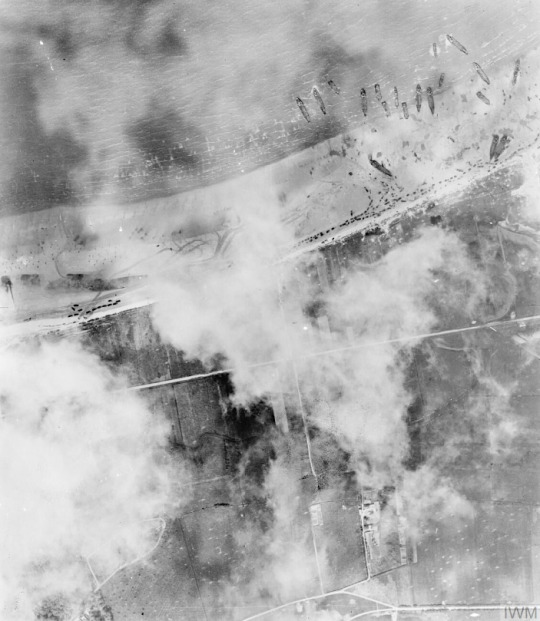
Packing Normandy
By the end of D-Day, 135,000 men had been landed and relatively few casualties were sustained – some 5,000 men. There were some serious cock-ups, notably the hopeless dispersal of the paratroopers (only 4% of the US 101st Air Division were dropped at the intended target zone), but, if anything, this caused even more confusion amongst the German commanders on the ground as it seemed the Allies were attacking everywhere. The defenders, overcoming the initial handicap that many area commanders were at a strategy conference in Rennes, did eventually organise themselves into a counterattack, deploying their reserves and pulling in troops from other parts of France. This is when French resistance and aerial bombing became crucial, seriously hampering the German army's effort to reinforce the coastal areas of Normandy. The German field commanders wanted to withdraw, regroup and attack in force, but, on 11 June, Hitler ordered there be no retreat.
All of the original invasion beaches were linked as the Allies pushed inland. To aid thousands more troops following up the initial attack, two artificial floating harbours were built. Code-named Mulberries, these were located off Omaha and Gold beaches and were built from 200 prefabricated units. A storm hit on 20 June, destroying the Mulberry Harbour off Omaha, but the one at Gold was still serviceable, allowing some 11,000 tons of material to be landed every 24 hours. The other problem for the Allies was how to supply thousands of vehicles with the fuel they needed. The short-term solution, code-named Tombola, was to have tanker ships pump fuel to storage tanks on shore, using buoyed pipelines. The longer-term solution was code-named Pluto (Pipeline Under the Ocean), a pipeline under the Channel to Cherbourg through which fuel could be pumped. Cherbourg was taken on 27 June and was used to ship in more troops and supplies, although the defenders had sunk ships to block the harbour and these took some six weeks to fully clear.
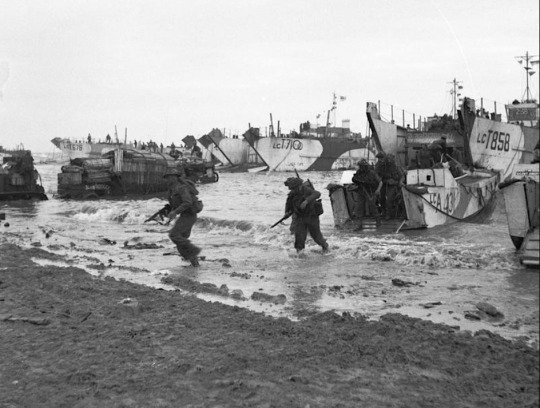
Operation Neptune officially ended on 30 June. Around 850,000 men, 148,800 vehicles, and 570,000 tons of stores and equipment had been landed since D-Day. The next phase of Overlord was to push the occupiers out of Normandy. The defenders were not only having logistical problems but also command issues as Hitler replaced Rundstedt with Field Marshal Günther von Kluge (1882-1944) and formally warned Rommel not to be defeatist.
Aftermath: The Normandy Campaign
By early July, the Allies, having not got further south than around 20 miles (32 km) from the coast, were behind schedule. Poor weather was limiting the role of aircraft in the advance. The German forces were using the countryside well to slow the Allied advance – countless small fields enclosed with trees and hedgerows which limited visibility and made tanks vulnerable to ambush. Caen was staunchly defended and required Allied bombers to obliterate the city on 7 July. The German troops withdrew but still held one-half of the city. The Allies lost around 500 tanks trying to take Caen, vital to any push further south. The advance to Avranches was equally tortuous, and 40,000 men were lost in two weeks of heavy fighting. By the end of July, the Allies had taken Caen, Avranches, and the vital bridge at Pontaubault. From 1 August, Patton and the US Third Army were punching south at the western side of the offensive, and the Brittany ports of St. Malo, Brest, and Lorient were taken.
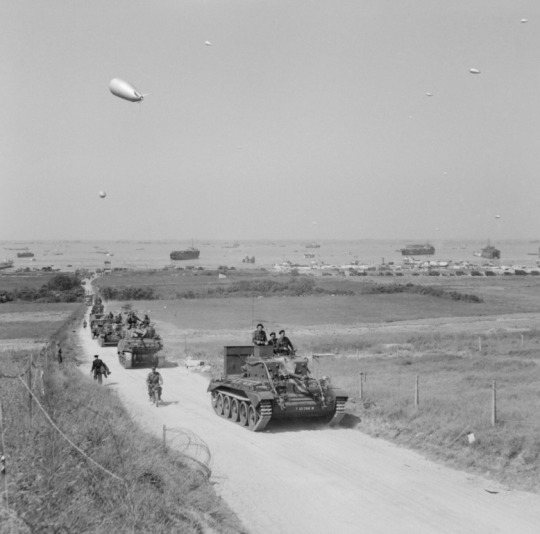
German forces counterattacked to try and retake Avranches, but Allied air power was decisive. Through August 1940, the Allies swept southwards to the Loire River from St. Nazaire to Orléans. On 15 August, a major landing took place on the southwest coast of France (French Riviera landings) and Marseille was captured on 28 August. In northern France, the Allies captured enough territory, ports, and airfields for a massive increase in material support. On 25 August, Paris was liberated. By mid-September, the Allied troops in the north and south of France had linked up and the campaign front expanded eastwards pushing on to the borders of Germany. There would be setbacks like Operation Market Garden of September and a brief fightback at the Battle of the Bulge in December 1944, but the direction of the war and ultimate Allied victory was now a question of not if but when.
138 notes
·
View notes
Text
US-made Douglas Boston bombers in British RAF service raid steel works at Anzin, German-occupied France, at low level on 16 August 1943
#wwii#aviation#combat footage#axis occupation of france#western front#strategic bombing campaign over europe#august
62 notes
·
View notes
Text
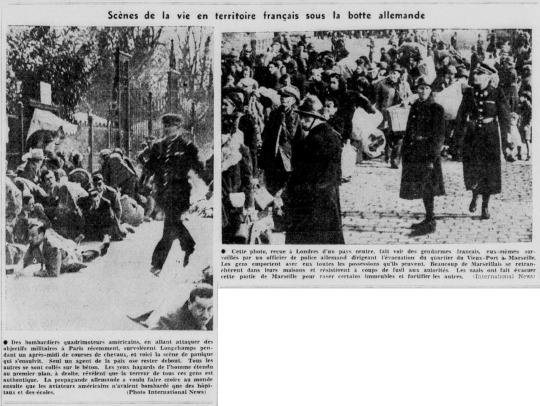
"Scènes de la vie en territoire français sous la botte allemande," Le Soleil. May 7, 1943. Page 1. ---- Des bombardiers quadrimoteurs américains, en allant attaquer des objectifs militaires à Paris récemment, survolèrent Longchamps pendant un après-midi de courses de chevaux, et voici la scène de panique qui s'ensuivit. Seul un agent de la paix ose rester debout. Tous les autres se sont collés sur le béton. Les yeux hagards de l'homme étendu au premier plan, à droite, révèlent que la terreur de tous ces gens est authentique. La propagande allemande a voulu faire croire au monde ensuite que les aviateurs américains n'avaient bombardé que des hópitaux et des écoles. (Photo International News)
Cette photo, reçue à Londres d'un pays neutre, fait voir des gendarmes français, eus-mêmes surveillés par un officier de police allemand dirigeant l'évacuation du quartier du Vieux-Port à Marseille. Les gens emportent avec eux toutes les possessions qu'ils peuvent, Beaucoup de Marseillais se retrancherent dans leurs maisons et résistèrent à coups de fusil aux autorités. Les nazis ont fait évacuer cette partie de Marseille pour raser certains immeubles et fortifier les autres. (International News)
#paris#gendarmerie nationale#occupied france#vichy france#regime de vichy#marseille#german occupation#nazi empire#air raids#bombing raids#world war ii
0 notes
Text
the Zionists and the Nazis AUGUST 8, 2024
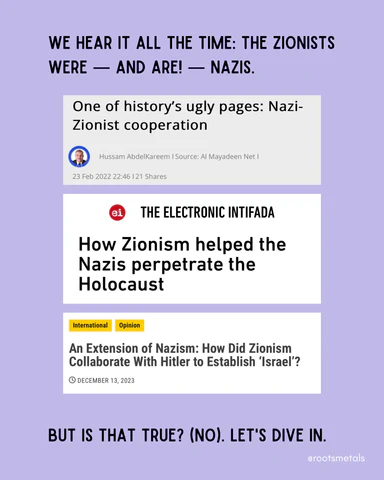
THE HAAVARA AGREEMENT
Immediately following Hitler’s rise to power in 1933, the Nazis wasted no time in passing antisemitic legislation, including a boycott of Jewish businesses, and, between 1933-1938, a process known as “voluntary Aryanization” (which later became “mandatory Aryanization”) transferred Jewish businesses and assets to Germans. German Jews became increasingly desperate to flee, but no countries wanted to take in Jewish refugees, and this economic marginalization made emigration virtually impossible.
In 1933, Eliezer Hoofein, the director of the Anglo-Palestine Bank, and the Reich Economics Ministry negotiated the Haavara Agreement. Under the terms of the agreement, Jews fleeing persecution in Germany could use their assets to purchase German goods for export, thus salvaging their assets and facilitating emigration to Palestine under the immigrant investor visa, in spite of severe British antisemitic immigration restriction policies.
Even so, the Haavara Agreement was met with staunch opposition, both among Zionist and anti-Zionist Jews. In response to the Nazi boycott of Jewish businesses, Jews worldwide enacted a boycott on German goods themselves. The Haavara Agreement was not in line with the Jewish anti-German boycott, as the Jewish community in both Germany and Palestine would be purchasing German goods. German public opinion also opposed the agreement. The Haavara Agreement was dissolved after World War II broke out in 1939.
The Haavara Agreement, though deeply controversial, ultimately saved the lives of some 60,000 German Jews. For context, the Haavara Agreement was similar to making a hostage deal with Hamas…making a deal with a hostile, genocidal enemy to save the lives of your own people. It wasn’t Zionist-Nazi “collaboration” by any stretch of the imagination.
LEHI-NAZI TIES
Lehi, pejoratively known as the “Stern Gang,” was an extremist right wing Jewish terrorist group in Mandatory Palestine. Believing that the British occupation of the Land of Israel was a much bigger threat to world Jewry than Nazism, they tried to establish contact with the Nazis twice, hoping to establish an alliance. The Nazis rejected them both times, because the Nazis would not ally with Jews, regardless of their views.
Lehi constituted no more than 300 members, whose views were fringe and non-representative of the Jewish community.
Ultimately, the Nazis never would’ve allied with any Zionist group.
In 1937, a Nazi document on foreign policy read, “(1) The formation of a Jewish state or a Jewish-led political structure under British mandate is not in Germany’s interest…(2) Germany therefore has an interest in strengthening the Arab world as a counterweight against such a possible increase in power for world Jewry.”
JEWISH PARTISANS
The organized Jewish resistance during the Holocaust was predominantly Zionist. In fact, Zionism was a major motivator for Jews joining the resistance.
In Poland, the main partisan organization, Żydowska Organizacja Bojowa (ZOB), meaning “Jewish Combat Organization,” was formed out of Zionist youth groups.
The first Jewish resistance organization in Nazi-occupied Europe, the Lithuanian Fareynikte Partizaner Organizatsye (FPO), meaning “United Partisan Organization,” had a strong Zionist presence. Two of its three leaders, Abba Kovner and Josef Glazman, were prominent figures in the Zionist movement.
In France, Jews, who comprised one percent of the total French population, formed between 15-20 percent of the resistance. In 1942, French Jewish partisans founded the Zionist Armée Juive, meaning “Jewish Army.”
Among the most recognizable Jewish partisan groups during the Holocaust were the Bielski brothers, who hid in the forest and rescued over a thousand Jews, and whose story was depicted in the film Defiance. The oldest Bielski brother and commander of the group, Tuvia, had long been interested in the Zionist youth movement.
WARSAW GHETTO UPRISING
The Warsaw Ghetto Uprising, which lasted from April 16 to May 16, 1943, was the largest Jewish uprising against the Nazis during the Holocaust.
In March of 1942, a number of Zionist Jewish youth groups inside the Warsaw Ghetto first proposed the creation of a Jewish self-defense force.
After 250,000+ Warsaw Jews were deported to the Treblinka death camp in the summer of 1942, two Zionist organizations — the left-wing socialist Jewish Combat Organization and the right-wing Jewish Military Union — formed and began training.
The Warsaw Ghetto Uprising was a last-ditch effort to resist the Nazi liquidation of the Warsaw Ghetto — that is, the deportation of all of Warsaw’s Jews to extermination camps to be gassed or worked to death. The uprising was led by the Jewish Combat Organization and the Jewish Military Union, which, again, were both Zionist groups.
According to German records, the only German casualties in 29 days of fighting during the Warsaw Ghetto Uprising were 17 Nazi soldiers. The Germans responded by burning the entirety of the ghetto, resulting in 13,000 Jewish deaths, most of whom suffocated to death or were burnt alive. Another 36,000 Jews were sent to death camps.
THE YISHUV
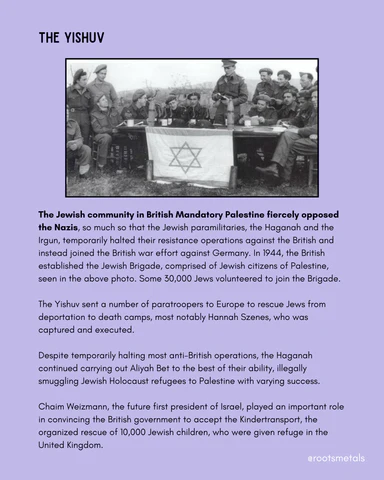
The Jewish community in British Mandatory Palestine fiercely opposed the Nazis, so much so that the Jewish paramilitaries, the Haganah and the Irgun, temporarily halted their resistance operations against the British and instead joined the British war effort against Germany. In 1944, the British established the Jewish Brigade, comprised of Jewish citizens of Palestine, seen in the above photo. Some 30,000 Jews volunteered to join the Brigade.
The Yishuv sent a number of paratroopers to Europe to rescue Jews from deportation to death camps, most notably Hannah Szenes, who was captured and executed.
Despite temporarily halting most anti-British operations, the Haganah continued carrying out Aliyah Bet to the best of their ability, illegally smuggling Jewish Holocaust refugees to Palestine with varying success.
Chaim Weizmann, the future first president of Israel, played an important role in convincing the British government to accept the Kindertransport, the organized rescue of 10,000 Jewish children, who were given refuge in the United Kingdom.
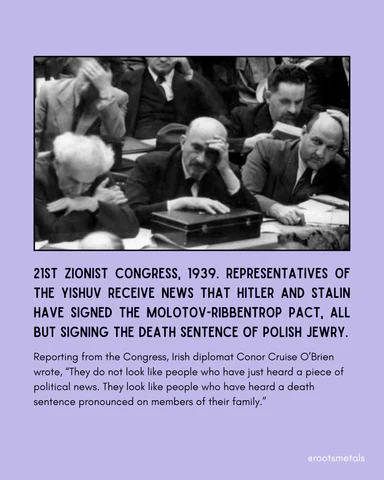
ORIGIN OF THE ZIONISM = NAZISM LIBEL
The accusation that Zionists are Nazis has its roots in the British Foreign Office during the period of the British Mandate of Palestine. In March of 1945 — about two months before the Nazis even surrendered— the High Commissioner of Palestine, Lord Gort, told the Colonial Secretary in London that “the establishment of any Jewish State in Palestine…will almost inevitably mean the rebirth of National Socialism [i.e. Nazism] in some guise.”
In 1969, the United Nations passed the International Convention on the Elimination of All Forms of Racial Discrimination. Both the United States and Brazil wanted to add a clause including antisemitism. The Soviet Union, which had been heavily oppressing its Jewish population, worried that such a clause would be used to rebuke them for persecuting Soviet Jews. As such, they included a counter proposal, which was a clause that equated Zionism to Nazism. That way, they could say they were persecuting Zionists, not Jews. Neither clause passed.
In 1985, the Anti-Zionist Committee of the Soviet Public published a propagandist brochure known as the “Criminal Alliance of Zionism and Nazism,” which claimed that there was irrefutable proof that the Zionists not only had collaborated with the Nazis, but were also responsible for the genocide of Jews, Slavs, and others in Europe. When Israel captured and tried Adolf Eichmann in the 1960s, the Soviets painted the Israel-West Germany relationship as “evidence” that the Zionists had colluded with the Nazis. Soviet anti-Zionist propaganda in the Arab world was so pervasive that it even influenced the dissertation of current so-called “moderate” Palestinian Authority President Mahmoud Abbas, titled “The Other Side: The Secret Relationship between Nazism and Zionism.” According to Abbas, Israel captured Eichmann “to prevent the ‘sacred secrets’ of this [Zionist-Nazi] collaboration from becoming public.”
rootsmetals
Hannah Szenes wasn’t tortured and executed for your disrespectful ass to come and say the Zionists collaborated with the Nazis 🙄
92 notes
·
View notes
Text
The Wolf and The Fox
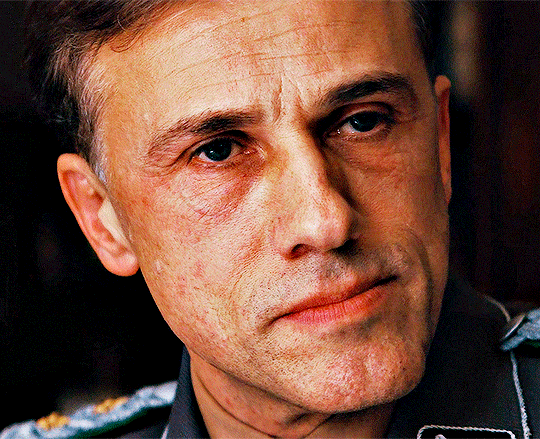
Pairing: Hans Landa x reader, slight Aldo Raine x reader but brief.
Description: As the only female Basterd it's your job to seduce Landa to gain information that may just tip the scales towards the Allies in this war. However, this job may be more mentally and emotionally tolling than expected, leaving you wondering where your true loyalties lie.
Warnings: Manipulation, gaslighting, mentions of Nazism/Nazis (naturally), betrayal, character death (not reader), suggestive but no smut.
Length: 11.7k (ya'll I went crazy)
You stepped into the softly lit dining room of the chateau, each footfall measured, each glance deliberate. Your dress was selected to attract attention but not suspicion—elegant but understated, fitting for your cover as an American socialite stranded in German-occupied France. You were here to gather intel from Hans Landa, the notorious “Jew Hunter.” Your mission was to gain his trust, charm him, and extract the secrets buried in his cunning mind.
Landa rose as you entered, his wolfish smile already in place. “Ah, Fräulein,” he said in a tone dripping with feigned warmth. “I must say, you bring an unexpected brightness to this dreary war.”
“Colonel Landa,” you replied, offering a polite smile. You extended your hand, and he took it, his grip firm but not oppressive. His lips brushed the back of your hand, his eyes locking onto yours as though daring you to look away.
“Please, sit,” he said, gesturing to the small, candlelit table set for two.
You obeyed, smoothing your dress as you sat. The air between you felt charged, like a taut wire. Landa’s reputation preceded him; you’d been briefed extensively on his charm, his ruthlessness, and his unsettling ability to peel back people’s layers with terrifying ease.
“Wine?” he offered, already pouring without waiting for an answer.
“Thank you,” you said, accepting the glass.
He sat across from you, folding his hands on the table and leaning forward slightly. His eyes never left you, scrutinizing every movement, every breath. “So, Fräulein, tell me—what brings an American woman to our humble corner of the world?”
You sipped your wine, using the moment to gather your thoughts. “I was visiting Europe when the war began. Circumstances have kept me here longer than I intended.”
“Ah,” Landa said, his voice light, but his smile betrayed a deeper curiosity. “And yet, you seem remarkably at ease in occupied France. One might even say… comfortable.”
You tilted your head, mirroring his playful tone. “I’ve learned that survival often depends on adapting to one’s circumstances, Colonel.”
Landa’s eyes glinted with amusement. “How pragmatic. I find that adaptability is a trait I greatly admire in others.” He took a sip of his own wine, letting the silence stretch just long enough to make you feel his scrutiny. “And how, may I ask, have you adapted to the company of German officers?”
You met his gaze, allowing a hint of a smile to play at your lips. “By keeping them entertained, of course.”
Landa chuckled, a low, rich sound that sent a shiver down your spine. “A sharp tongue, an even sharper wit. I do enjoy clever company.”
You leaned forward slightly, careful to keep your movements subtle and deliberate. “And I enjoy men who appreciate a woman’s intelligence.”
Landa’s smile widened, his predatory nature slipping through for just a moment. “Then we are well-matched, Fräulein.”
The conversation continued, a delicate dance of words and glances. You allowed yourself to flirt just enough to keep his interest piqued, to keep him guessing about your intentions. Beneath the surface, you were cataloging every detail of the room, every piece of information he let slip, no matter how trivial it seemed.
But Hans Landa was not a man to be underestimated. He leaned back in his chair, his expression shifting to one of casual curiosity. “You are quite skilled at this, you know.”
“At what, Colonel?” you asked, feigning innocence.
“At making people believe exactly what you want them to,” he said, his smile sharp as a knife.
Your heart skipped a beat, but you didn’t let it show. Instead, you raised your glass to him. “Then perhaps we’re more alike than you think.”
Landa laughed again, genuine this time. “Touché, Fräulein. Touché.”
As the evening wore on, you couldn’t shake the feeling that you were walking a razor’s edge. Landa was too clever, too perceptive. But you also knew that his ego was his greatest weakness. And if you played your cards right, you might just come out of this alive—with the information the Basterds so desperately needed.
For now, the game continued, with each move being more dangerous than the last.
The dinner wore on, the two of you circling each other like predators testing the boundaries of their territories. You leaned into the role you were assigned, allowing Hans to feel that he was the one leading the conversation, the dance. But with every veiled compliment you offered, every calculated sip of wine, you knew you were feeding his ego—your most valuable tool.
“Tell me, Fräulein,” he began, setting his glass down with deliberate care. “Do you enjoy the theater?”
“The theater?” you repeated, tilting your head in mock consideration. “I suppose it depends on the performance.”
He smiled, pleased by your response. “And how would you describe tonight’s performance?”
You felt the trap hidden beneath his words, but you didn’t flinch. Instead, you allowed a soft, amused smile to curve your lips. “I’d say it’s riveting. A masterclass in… subtlety.”
Landa chuckled, the sound low and indulgent. “Flattery will get you far, my dear. But I must confess, you are far more engaging than most of the company I’m accustomed to.”
“And you are far more charming than I anticipated, Colonel,” you replied, leaning forward slightly, your voice dropping just enough to hint at something more. “I imagine you don’t often hear that.”
“Oh, on the contrary,” he said, his smile widening into something sharper. “I hear it often. But sincerity… that is rare. And I do believe you are sincere.”
He was testing you now, watching your every reaction, waiting for a crack in your facade. You forced a laugh, light and melodic, as if his comment were nothing more than a clever jest. “Well, I wouldn’t dream of lying to you, Colonel. That would be terribly unwise.”
“Indeed, it would,” he said, his tone dipping into something darker. “But you don’t strike me as someone who shies away from taking risks.”
You met his gaze, your heart pounding in your chest. His words felt like a challenge, a thinly veiled acknowledgment that he suspected there was more to you than met the eye. But you couldn’t afford to falter now.
“Life is full of risks, Colonel,” you said, your voice steady. “The key is knowing which ones are worth taking.”
His eyes sparkled with something you couldn’t quite place—amusement? Suspicion? Admiration? Perhaps all three. “Wise words. Tell me, Fräulein, what risks have you deemed worth taking recently?”
You hesitated just long enough to make it seem as though you were considering your answer carefully. “Sitting across from you tonight,” you said finally, allowing a playful smirk to tug at your lips.
Hans laughed, a genuine, hearty laugh that echoed through the room. “Oh, you are delightful,” he said, shaking his head. “It’s been far too long since I’ve encountered someone with your… talents.”
You smiled demurely, but your mind was racing. Every word, every glance, was part of a game you couldn’t afford to lose. Hans Landa was far too intelligent, far too dangerous, to underestimate. And yet, you could feel that he was intrigued by you, perhaps even a little disarmed.
But then, just as you began to feel the faintest sense of control, he leaned forward, his expression shifting to something colder, sharper. “Tell me, my dear,” he said softly, his voice almost a whisper, “what really brought you to occupied France?”
Your blood ran cold, but you didn’t let it show. Instead, you let out a soft laugh, meeting his gaze with a steady calm you didn’t entirely feel. “I already told you, Colonel. Circumstance.”
“Hmm,” he murmured, leaning back in his chair, his fingers steepled beneath his chin. “Circumstance can be such a convenient excuse, don’t you think?”
The game had changed. Landa wasn’t just toying with you anymore; he was hunting.
And you were the prey.
Your breath hitched, but you recovered quickly. Landa’s eyes were locked onto yours, sharp and predatory, and yet there was something else there—a flicker of amusement, of genuine curiosity. He was testing you, yes, but you couldn’t ignore the magnetic pull of his presence.
There was a strange allure to him, something that both repelled and intrigued you. You weren’t blind to his cruelty, to the blood on his hands, but the way he carried himself—his charm, his intelligence—made it impossible not to feel drawn in, even against your better judgment.
You smiled, letting your lashes flutter slightly as you tilted your head. “Convenient, perhaps,” you said, your voice soft and measured. “But sometimes convenience is all we have in times like these.”
He chuckled, a deep, resonant sound that sent an unexpected warmth through you. “You’re quite adept at turning a phrase, my dear. It’s refreshing.”
The conversation had shifted again, the tension between you no longer just a game of wits. It was something deeper, more dangerous. You could feel it in the way his gaze lingered on you, in the slight smirk tugging at his lips.
“I imagine you don’t often find yourself in refreshing company, Colonel,” you said, leaning forward just enough to blur the line between formality and intimacy.
“Indeed,” he said, his voice low. “Most people I encounter are far less… stimulating.”
Your pulse quickened as his words settled between you. The way he looked at you now wasn’t just calculating; it was hungry. And to your own surprise, you didn’t hate it.
Landa rose suddenly, his movements graceful and deliberate, and made his way around the table. He stopped beside you, his presence overwhelming. You turned to look up at him, your breath catching as he leaned down, his face inches from yours.
“Do you enjoy dancing, Fräulein?” he asked, his voice a soft murmur.
“I do,” you managed to reply, your voice quieter than you intended.
He extended a hand, his smile deepening. “Then allow me.”
You hesitated for a fraction of a second before placing your hand in his. His grip was warm, firm, and he pulled you to your feet with an ease that sent a shiver through you. The room was silent save for the soft crackle of the fire, but Landa began to hum a quiet melody as he guided you into a slow waltz.
His hand rested at your waist, his other holding yours as he led you in a steady rhythm across the room. You tried to focus, to remind yourself why you were here, but the way he looked at you—the intensity, the confidence—made it impossible to think clearly.
“You’re trembling,” he murmured, his voice almost teasing.
“It’s the wine,” you said quickly, though you both knew it wasn’t true.
He smiled, his grip on your waist tightening slightly as he pulled you closer. “I find that hard to believe.”
The proximity was intoxicating. You could feel the heat radiating from him, could smell the faint scent of cologne and tobacco that clung to him. His gaze locked onto yours, and for a moment, it felt as though the rest of the world had disappeared.
“Tell me,” he said softly, his voice like a velvet caress. “What is it you’re truly afraid of, my dear?”
Your throat tightened. He was too close, too perceptive. And yet, a part of you didn’t want to pull away. “I’m not afraid,” you said, though your voice betrayed you.
His smile widened, and he leaned in, his lips brushing the shell of your ear as he spoke. “Lying doesn’t suit you.”
Your breath hitched, and you felt your resolve slipping. You should have pushed him away, should have refocused on the mission, but the way his voice curled around you, the way his hand pressed against your back—it was dizzying.
“I wonder,” he murmured, his lips barely grazing your skin, “if the risks you take are worth the reward.”
“And what reward might that be, Colonel?” you asked, your voice barely above a whisper.
He pulled back just enough to meet your eyes, his expression a mix of amusement and something darker. “That depends on you.”
The air between you was electric, the lines between duty and desire blurring with every passing second. You knew you were playing a dangerous game, but for the first time, you weren’t sure you wanted to win.
The room felt smaller now, the air between you charged with an energy that was equal parts danger and allure. Hans Landa’s hand remained firmly at your waist, his thumb brushing against the fabric of your dress in a way that felt far too intimate. You told yourself this was all part of the mission, part of the game you were playing, but the pounding of your heart betrayed you.
“Perhaps it’s my turn to ask a question,” Landa said, his voice smooth as silk. He stopped your movement abruptly, keeping you close as his dark eyes searched yours.
You swallowed hard, forcing yourself to maintain your composure. “What do you want to know, Colonel?”
His smile deepened, and he tilted his head slightly, as if considering his next move. “Why is it that you tremble when I touch you, but you don’t pull away?”
The question hung in the air like a challenge. You opened your mouth to respond, but no words came. How could you admit, even to yourself, that his presence unsettled you in a way that was both thrilling and terrifying?
“I’m not trembling,” you said finally, your voice steadier than you expected.
Landa raised an eyebrow, his smile turning almost predatory. “Are you sure?”
Before you could respond, he released your hand, only to raise it to your face, his fingers brushing the line of your jaw. The touch was light, almost reverent, but it set your nerves alight.
“Tell me, Fräulein,” he murmured, his thumb tracing the corner of your lips, “do you always lie so beautifully?”
You stepped back instinctively, but he followed, closing the distance between you in a single, fluid motion. “You seem nervous,” he said, his tone soft, but his eyes were alight with amusement. “Do I frighten you?”
Yes. He did. Not because of his reputation, though that alone was reason enough, but because of the way he made you feel. The pull toward him was undeniable, and that terrified you more than anything else.
“I’m not afraid of you,” you lied, your voice barely above a whisper.
“Good,” he said, his hand sliding from your jaw to the back of your neck. “Because I would hate to think you didn’t trust me.”
The way he said it sent a shiver down your spine. You were acutely aware of how close he was, of the heat radiating from him, of the way his gaze lingered on your lips.
“This isn’t appropriate,” you managed to say, your voice faltering.
“Appropriate?” he repeated, his tone dripping with amusement. “We are at war, my dear. The concept of appropriateness is as fragile as peace itself.”
His fingers pressed gently against the nape of your neck, tilting your head slightly. You knew you should push him away, create distance, regain control. But the intensity of his gaze rooted you in place, your body betraying your mind.
“You don’t need to be afraid of what you feel,” he murmured, his lips so close to yours now that you could feel his breath.
The words sent a surge of panic through you. Did he know? Could he see the war waging within you—the fight between duty and desire, between logic and the inexplicable pull toward him?
“I—” you started, but the words caught in your throat.
He silenced you with a quiet hum, his hand sliding from your neck to your cheek. His touch was impossibly gentle, a stark contrast to the sharp edge of his words. “You are an enigma, Fräulein,” he said softly. “And I find myself quite unable to resist unraveling you.”
Your breath hitched as his lips brushed against yours—not a kiss, not yet, but a deliberate test, a dare. You froze, your heart pounding so loudly you were certain he could hear it.
“Tell me to stop,” he said, his voice low and filled with a dangerous kind of tenderness.
You couldn’t speak. Your mind screamed at you to push him away, to remember the mission, the stakes, the lives that depended on your success. But your body betrayed you, leaning ever so slightly into his touch.
“Interesting,” he murmured, his lips ghosting over your cheek as he pulled back just enough to meet your eyes. “You seem conflicted, my dear. Care to share your thoughts?”
You stared at him, your pulse racing. “I think…” you began, your voice trembling. “I think this is dangerous.”
Landa’s smile returned, slow and deliberate. “Ah, but isn’t danger what makes life exciting?”
You hated how much you wanted to agree with him. Hated how much you wanted him to close the distance between you, to give in to the tension that had been building all evening. But you also knew that giving in would mean losing control—not just of the situation, but of yourself.
And in Hans Landa’s world, losing control could be fatal.
______________________________________________________________
The barn was quiet save for the faint rustling of hay underfoot as you stepped inside, pulling your coat tighter around you against the night’s chill. The weight of the evening still pressed against your chest, the memory of Hans Landa’s hands on your waist, his voice curling around your thoughts like smoke. You wanted to shake it off, to bury it beneath the mission, but it clung to you stubbornly.
“Well, look who finally decided to show up,” Raine drawled from the shadows, stepping forward with his usual swagger. His sharp eyes swept over you, narrowing slightly. “Took ya long enough. Thought maybe the big bad wolf gotcha.”
“I had to make it convincing,” you said, keeping your voice steady as you crossed the room. You’d rehearsed your explanation on the way here, but now, under Aldo’s scrutiny, the words felt thin.
“You get anything useful?” he asked, leaning casually against a post, though there was nothing casual about the way he was watching you.
You nodded, recounting what you’d learned—snippets of troop movements, subtle hints about upcoming plans, just enough to prove you’d been paying attention without betraying the full scope of the evening. But even as you spoke, Raine’s gaze never left you, his expression unreadable.
“And that’s all he gave ya?” he asked when you finished, his tone flat.
“For now,” you said. “He’s careful. But he’s intrigued, and that’s something we can use.”
Raine didn’t respond right away, his dark eyes boring into yours. Finally, he stepped closer, his voice low. “You sure you ain’t the one who’s intrigued?”
The question hit harder than you expected, and you stiffened, forcing yourself to meet his gaze. “I know what I’m doing,” you said, a little too sharply.
“Do ya?” he shot back, his tone calm but cutting. “’Cause somethin’ tells me you ain’t as steady as you’re lettin’ on.”
You opened your mouth to argue but stopped when he stepped even closer, his voice dropping further. “Look, I ain’t gonna pretend this is easy. Landa’s a sly bastard, and I’ve seen plenty of people underestimate him. But you—you’re actin’ like you don’t know which way’s up anymore. And that’s dangerous, darlin’.”
You clenched your jaw, willing yourself not to react. “I told you, I’ve got it under control.”
Raine studied you for a long moment, his eyes narrowing. “Maybe you do. But lemme tell ya somethin’—that snake don’t charm folks for fun. He does it ‘cause it gets him what he wants. You start thinkin’ he’s more man than monster, you’re gonna lose. And when you lose, we all lose.”
His words cut deep, and for a moment, all you could do was stand there, your heart pounding in your chest.
“I know what’s at stake,” you said finally, your voice quieter now. “And I know what he is.”
“Good,” Raine said, his tone softer but no less firm. “Just make sure you remember that next time you’re lookin’ into those snake eyes of his.”
He turned and walked away, leaving you alone in the barn. The silence felt heavier now, oppressive. You sank onto a bale of hay, pressing your palms against your temples as the weight of your own thoughts threatened to crush you.
You’d told Raine the truth—at least, part of it. You did know what Hans Landa was. But knowing didn’t make you immune to the pull of him, the way he seemed to peel back your defenses with nothing more than a glance, a word, a touch.
You told yourself it was all part of the mission, part of the role you had to play. But deep down, you couldn’t ignore the fear creeping into your chest—not fear of Landa, but fear of what he was beginning to awaken in you.
And worse, the fear that he already knew.
___________
The barn wasn’t just quiet—it was tense. You could feel the weight of unspoken words hanging in the air as the rest of the Basterds lingered in various states of disinterest or curiosity. Most of them didn’t even look up when you walked in. You’d been part of the team long enough to earn your place, but tonight, the stakes were higher, and so was the scrutiny.
You caught Donny’s eye first. He was sitting on an overturned crate, absently fiddling with his bat. His brow furrowed slightly when he saw you, but he didn’t say anything right away. Beside him, Wicki glanced up from cleaning his weapon and offered you a faint nod—a small but genuine gesture.
“Finally back, huh?” Donny said, breaking the silence. His tone was light, but there was an edge to it. “Thought maybe you decided to stay and dance the night away with Herr Colonel.”
You sighed, tugging your coat tighter around you. “Funny, Donowitz. Very funny.”
“You’re a regular comedian, Donny,” Wicki muttered without looking up.
“Just sayin’,” Donny continued, ignoring him. “You go toe-to-toe with the Jew Hunter himself, and all you got to show for it is a couple crumbs about troop movements? Doesn’t exactly scream success to me.”
You bristled, but before you could respond, Wicki cut in. “Don’t listen to him. He wouldn’t know subtlety if it hit him in the head.”
“Subtlety doesn’t get results,” Donny shot back, turning his attention to you. “So? Did he spill his guts, or was he too busy trying to charm you?”
“Enough,” you snapped, your voice sharper than you intended. The barn fell silent, and you felt their eyes on you—curious, skeptical, and in some cases, accusatory.
It was Omar who broke the tension, stepping forward from where he’d been leaning against the wall. “Hey,” he said, his voice low and calm. “You okay?”
You blinked at the question, caught off guard by the genuine concern in his eyes. Omar wasn’t one to speak up much, but when he did, it was always sincere.
“I’m fine,” you said, though the words felt hollow.
Omar studied you for a moment longer before nodding. “Good. Just… don’t let Donny get in your head.”
“Hey, I’m just sayin’ what we’re all thinkin’,” Donny said, throwing up his hands. “You spend too much time cozying up to a guy like Landa, you’re gonna forget whose side you’re on.”
“That’s enough,” Wicki said sharply, his tone cutting through the room. He turned to you, his expression softening. “You did fine. We all know Landa’s not easy to crack. Just don’t let him get too close.”
“He’s not,” you said quickly, but even as the words left your mouth, you felt their weight. Were you trying to convince them, or yourself?
“Good,” Wicki said. “Because the moment he does, it’s game over. For all of us.”
The barn fell quiet again, the tension thick enough to cut with a knife. You shifted uncomfortably, feeling the weight of their gazes, of their expectations. You’d been on plenty of missions before, but this felt different—more personal, more dangerous.
As the group began to disperse, you caught sight of Raine lingering by the door, his arms crossed over his chest. He didn’t say anything, but the look he gave you was enough: a silent warning, a reminder of the stakes.
You sighed, running a hand through your hair as you sank onto a bale of hay. Omar sat down beside you, his presence quiet but reassuring.
“You really okay?” he asked again, his voice softer this time.
You hesitated, the weight of the night pressing down on you. “I don’t know,” you admitted finally. “I feel like I’m walking a tightrope, and one wrong step…”
Omar nodded, his expression thoughtful. “Just don’t forget you’ve got a net,” he said. “We’ve got your back. No matter what.”
You managed a faint smile, grateful for the gesture. But as Omar’s words sank in, you couldn’t help but wonder if they’d still hold true if they knew the truth—if they knew how much of you Landa had already unraveled.
And worse, how much you feared you might let him.
_______________
The morning air in the barn was sharp, cutting through the haze of exhaustion that clung to you after last night. The Basterds were already stirring, their voices low but charged with energy. They were preparing, strategizing, and most importantly, waiting for you to play your role.
Raine stood at the center of it all, his arms crossed, radiating his usual mix of authority and impatience. As soon as you stepped inside, his eyes locked onto you.
“You’re late,” he said, though his tone was more matter-of-fact than accusatory.
“Long night,” you replied evenly, though the truth of it weighed heavier than you’d let on.
“Good,” he said, surprising you. “Means we ain’t wastin’ time. You’re meetin’ him again tonight, right?”
You nodded, and he gave a curt nod in return.
“Then we’re gonna make sure you’re ready this time. No surprises, no stumblin’. Landa’s a predator, and you’re the bait—but you’re gonna make him think he’s the one being hunted.”
The group murmured in agreement, though their faces told different stories. Wicki and Omar seemed genuinely invested, their eyes full of quiet concern. Donny, meanwhile, leaned against a post with his bat in hand, his expression skeptical.
“I don’t see why we’re wasting time,” Donny said, breaking the silence. “She already met the guy once. If she couldn’t nail him then, what makes you think she’ll do it now?”
“That’s enough,” Wicki snapped, his voice sharp.
“I’m just sayin’,” Donny continued, throwing his hands up. “She’s walking back into the same den with nothin’ but her charm and a prayer. Sounds like a suicide mission to me.”
“It’s not your call,” Raine cut in, his tone brooking no argument. He turned back to you. “Sit. We’re runnin’ through scenarios.”
You hesitated but obeyed, taking the chair in the middle of the barn as Raine gestured for another. He sat across from you, the air around him shifting as he leaned back and transformed.
In a matter of seconds, he wasn’t Aldo Raine anymore. His posture straightened, his grin turned sly, and his gaze sharpened into something unsettlingly familiar.
“Good evening, Fräulein,” he said, slipping into a near-perfect imitation of Hans Landa’s smooth drawl. “I trust you slept well after our last encounter?”
The room fell silent, all eyes on you.
“I did, thank you,” you said, forcing your voice to remain steady. “And yourself?”
Raine smirked, the tilt of his head eerily reminiscent of the real Landa. “Oh, I always sleep well, knowing I am surrounded by such… fascinating company.”
You felt your stomach twist, his mimicry cutting a little too close. Still, you straightened your back and met his gaze head-on.
“I’m sure you do,” you said, allowing a hint of playfulness to creep into your tone. “But surely a man of your… intelligence doesn’t trust so easily.”
Raine’s eyes narrowed slightly—he was testing you. “Trust is such a fickle thing, wouldn’t you agree? One must earn it. Or take it.”
“Which do you prefer?” you shot back.
The corner of his mouth twitched, and you could almost see the approval flicker in his eyes. “Ah, Fräulein, I think you’re beginning to understand me.”
“Enough of the games,” Wicki interrupted from the sidelines. “Ask her something real, something he might use to trip her up.”
Raine tilted his head, slipping further into character. “Very well, Herr Wicki. Let us see how the Fräulein fares under pressure.” He turned back to you, his expression unreadable.
“Tell me,” he said, his voice soft but cutting, “why is it that a woman of your beauty and charm would risk her neck for something as messy as war? Surely there are safer, more lucrative pursuits for someone like you.”
You hesitated, your mind racing. The real Landa would never accept a half-baked answer.
“Perhaps I enjoy the challenge,” you said finally, forcing a confident smile. “After all, a little risk keeps life interesting.”
Raine raised an eyebrow, his expression darkening. “Or perhaps,” he said, his tone turning razor-sharp, “you’re hiding something. A secret, perhaps? Something that would explain why you find yourself in such… dangerous company.”
The tension in the barn was palpable, every pair of eyes fixed on you.
“Isn’t everyone hiding something, Colonel?” you replied, leaning forward slightly. “But secrets have a way of revealing themselves to those who look closely enough. Don’t they?”
Raine’s smirk returned, and he leaned back in his chair, breaking character at last. “Not bad,” he said, his drawl slipping back into place. “You’re gettin’ there.”
“She’s better than ‘not bad,’” Omar said from the sidelines, his voice quiet but firm. “She’s ready.”
“Ready or not, she’s got no choice,” Donny muttered.
“Shut it, Donowitz,” Raine snapped, standing up and brushing off his coat. “She’s gonna be fine. But if any of you got doubts, keep ‘em to yourselves. Last thing she needs is a bunch of jackasses second-guessin’ her.”
The group dispersed slowly, the tension lingering in the air. As you stood to leave, Omar caught your arm, his grip gentle.
“You good?” he asked, his voice low.
“I’m fine,” you said, though the words felt hollow.
He studied you for a moment before nodding. “Just remember—you’ve got backup. No matter what.”
You nodded, grateful for his quiet support. But as you walked away, preparing yourself for the next meeting with Hans Landa, you couldn’t shake the feeling that no amount of preparation would shield you from what was coming.
Because this wasn’t just a game. It was a battle of wits, and you weren’t sure if you’d be the one to win.
__________
The sun was dipping below the horizon as you and Raine arrived at the edge of a quiet, cobblestoned village. The air was heavy with the scent of damp earth and wood smoke, and the sky was painted in muted shades of orange and purple. You felt a knot tightening in your stomach as you stepped out of the car, adjusting your coat against the chill.
“You sure about this?” Raine asked, his voice low. He leaned against the car, his sharp eyes scanning the area for any sign of danger.
“No,” you admitted, your voice barely above a whisper. “But that’s never stopped me before.”
Raine smirked faintly, his gaze softening for a brief moment. “Remember what we practiced. Keep him talkin’, stay in control. You feel like it’s slippin’—you signal, and I’ll be there.”
You nodded, clutching the small handbag at your side, its hidden compartment housing a blade and a cyanide pill. “I’ll be fine,” you said, though you weren’t sure if you were trying to convince him or yourself.
“Damn right you will.” Raine’s expression hardened again as he straightened up, adjusting his jacket. “Now go. And don’t let that bastard rattle you.”
You didn’t respond, instead taking a deep breath and walking toward the small café where Hans Landa waited. The street was quiet, almost eerily so, and the sound of your heels clicking against the stone echoed louder than you would have liked.
When you stepped inside, the café was dimly lit, its warm glow casting long shadows across the wooden tables. And there he was, sitting at a corner table with a glass of red wine in hand, his posture relaxed but commanding.
“Fräulein,” Landa greeted, rising to his feet with a smile that was equal parts charm and menace. “You look stunning this evening.”
“Colonel Landa,” you replied, your voice steady despite the quickening of your pulse. “Always a pleasure.”
He gestured for you to sit, and you did so, carefully draping your coat over the back of the chair. As you settled in, you felt his eyes on you, sharp and calculating.
“I must say,” he began, swirling the wine in his glass, “I was quite pleased when I received your message. It’s not often I have the opportunity to enjoy such delightful company twice in as many days.”
“I suppose I should consider that a compliment,” you said, forcing a small smile.
“Indeed, you should,” he replied, his tone light but laced with something darker. “Now, tell me—what brings you back to me so soon? Surely a woman like you has other… engagements.”
You tilted your head slightly, as if considering his question. “Let’s just say I found our last conversation intriguing. And I thought it might be worth continuing.”
Landa’s smile widened, his eyes narrowing ever so slightly. “Ah, intrigue. A dangerous game, Fräulein. But then, you do strike me as someone who enjoys a little danger.”
You didn’t flinch, instead leaning forward slightly, as if sharing a secret. “Only when it’s worth the risk.”
He chuckled, a low, almost musical sound that sent a shiver down your spine. “Well said. And tell me, what is it about me that you find so… intriguing?”
You felt the weight of his gaze, the challenge in his words. “You’re a man who thrives on control,” you said carefully. “And yet, you’re willing to let your guard down—just enough—to keep things interesting. That’s not something you see every day.”
Landa tilted his head, studying you like a puzzle he was determined to solve. “And what of you, Fräulein? What secrets do you hide behind that charming smile of yours?”
Before you could answer, the waiter arrived with a bottle of wine, interrupting the moment. Landa waved him off with a polite but dismissive gesture, then poured two glasses, sliding one toward you.
“To secrets,” he said, raising his glass. “And the thrill of uncovering them.”
You hesitated for the briefest moment before raising your own glass. “To secrets,” you echoed, clinking your glass against his.
As the evening wore on, the conversation ebbed and flowed, a careful dance of words and veiled intentions. Landa’s charm was disarming, his wit sharp enough to cut through any pretense. And yet, you found yourself holding your own, the hours of preparation with Raine and the Basterds serving you well.
But there were moments—fleeting, dangerous moments—when you felt the lines blurring. When his gaze lingered a little too long, or when your own words came too easily, too naturally.
And then there was the touch. A brief, fleeting brush of his fingers against yours as he handed you the wine. It was deliberate, you were sure of it, and it sent a jolt through you that you couldn’t ignore.
“Are you all right, Fräulein?” Landa asked, his voice soft and almost genuine. “You seem… distracted.”
“I’m fine,” you replied quickly, forcing a smile.
His smile returned, slow and knowing. “Good. Because I’d hate to think I was boring you.”
“Far from it,” you said, your voice steady despite the storm brewing inside you.
The game continued, each move more calculated than the last. But as the night wore on, you couldn’t help but wonder who was truly in control—and whether you were losing yourself in the process.
The space between you and Hans Landa had all but disappeared. His eyes, dark and intense, never left yours, and the weight of his gaze made your pulse race. Each word he spoke was calculated to draw you in, to break down the walls you had so carefully built.
Landa’s fingers lightly traced the rim of his wine glass, his lips curling into that infuriating, knowing smile that seemed to suggest he was always one step ahead. “You hide so much, Fräulein,” he murmured, his voice smooth and velvet-soft. “But I can see the flickers beneath your control. The way you hesitate before responding. The way you move closer, even though you tell yourself you shouldn’t.”
You barely breathed as you absorbed his words. The room felt warmer now, despite the cool evening air that slipped through the window. Your heart pounded in your chest, the beat steady but frantic. The magnetic pull between you was undeniable. And yet, you tried to remain grounded, to remember why you were here in the first place.
But his presence was suffocating, and all your defenses, carefully put in place over the years, seemed to be crumbling under the intensity of his stare.
“You’re wrong,” you whispered, your voice thick with uncertainty.
“Am I?” Landa asked, tilting his head slightly, the faintest glimmer of amusement in his eyes. He leaned forward just enough to close the gap, his breath warm against your skin. “Tell me, Fräulein. What are you really hiding?”
Your breath hitched, and for a moment, you swore you could hear nothing but the sound of your own heartbeat. He was too close now, too close for comfort. His hand, casually resting on the table, was only a few inches from yours, and every inch of your body seemed to ache with the temptation to close that distance.
You tried to speak, to maintain some semblance of composure, but the words refused to form. He was drawing you in, and you weren’t sure if you wanted to resist anymore.
The tension in the air was palpable, thick with unspoken words and longing. His eyes flickered to your lips, then back to your eyes, and you saw it—the hunger, the desire, and something deeper—something more dangerous.
“Fräulein,” he said softly, his voice now lower, almost tender. “You have no idea what you’re doing to me.”
His hand moved, slow and deliberate, brushing against yours. You froze for a moment, your pulse skittering at the light contact. But he didn’t pull away. Instead, his fingers lingered, just enough to make your breath catch in your throat.
Your heart pounded as you realized there was no turning back. The moment had arrived—the one you had feared, and yet somehow longed for.
Landa leaned in even closer, his lips a breath away from yours. You could feel the heat radiating from him, his body so close now that it felt like an inevitability.
And then, without a single word more, he kissed you.
It was gentle at first, almost tentative, as though he was testing you. His lips brushed against yours in a slow, deliberate motion, and your breath caught in your throat. Your mind screamed at you to pull away, to remember the mission, to hold onto your resolve. But your body—your body betrayed you.
You kissed him back.
The kiss deepened, his hand sliding to your cheek, cupping it as though he were marking his claim. The warmth of his touch spread through your entire body, the sharp, electric feeling of his presence overwhelming your senses. You could taste the wine on his lips, the slight trace of something darker in his flavor, something that sent a shiver of desire down your spine.
You felt yourself leaning into him, unable to stop. Every part of you seemed to crave him, even as your mind screamed in protest. But the kiss was intoxicating, and you couldn’t bring yourself to pull away.
Landa broke the kiss just long enough to pull back slightly, his breath heavy, his lips mere inches from yours. His gaze locked onto yours with an intensity that made your chest tighten.
“You don’t have to resist anymore, Fräulein,” he whispered, his voice low and filled with quiet triumph. “I know you feel it. The same thing I do.”
You couldn’t deny it. The desire was there, raw and undeniable. And for the first time since you’d met him, you realized that you wanted him—wanted him more than you cared to admit.
The room was spinning, your heart racing as he moved in once more, his lips claiming yours in a kiss that was full of promise and danger, a kiss that you knew would change everything.
There was no turning back now.
________
You entered the room with the others, trying to mask the unease gnawing at your stomach. You had gotten the intel—critical, valuable information—but it wasn’t just the mission that had weighed on your mind all evening. Hans Landa had invaded your thoughts more than you were willing to admit, and you knew you couldn’t stay lost in that dangerous game forever.
You placed the stack of documents on the table, watching as the Basterds gathered around, eager to hear what you had uncovered. Raine’s eyes followed you, calculating, unreadable, but you knew he’d been watching you ever since you left for your meeting with the Colonel. You didn’t dare make eye contact with him, though, afraid he’d see the truth in your gaze before you had the chance to explain.
“Well?” Donny barked, leaning forward with a grin. “What do you got for us, sweetheart?”
You took a steadying breath and forced yourself to focus. “I got everything we need,” you began, pushing the documents toward the group. “Landa’s plans, the key locations, and personnel lists. Even some of his more private dealings that could give us leverage.”
The room buzzed with excitement as the others pored over the papers, murmurs of approval and strategizing filling the air. They hadn’t noticed the tension in your posture yet, but Raine had. His gaze never left you, his expression too calm, too knowing.
As you stood there, watching the team digest the information, a creeping feeling of guilt weighed down on you. You had done your job—but at what cost? The memory of Landa’s touch, his quiet whispers, his deliberate flirty glances… it was all too much to process. You had let him get too close, and you weren’t sure what to do with it. What had started as a simple mission had turned into something far more complicated.
As the others discussed the next move, you stood off to the side, pretending to listen while your thoughts wandered back to the Colonel. You didn’t see Raine approach until he was standing directly in front of you, his presence commanding and intense. He wasn’t smiling—not that he ever did—but there was an unmistakable hardness in his eyes.
The moment the others were occupied with the details of their next plan, Raine spoke. “We need to talk.” His voice was low and clipped, and there was no room for negotiation in his tone.
You stiffened, swallowing the lump in your throat. “It’s been a long night, Raine,” you said, forcing a smile. “I’ll catch up with you later, okay?”
“No,” he said sharply. “Now. In private.”
His gaze was unwavering, and though you knew it wasn’t a request, you couldn’t bring yourself to defy him. You nodded, and he led you out of the room, his footsteps echoing through the halls as you walked silently behind him.
When you finally reached a small, empty room, Raine turned to face you, his eyes cold and assessing. “What happened?” he asked, his voice quiet but filled with a tension you could almost touch. “You’ve been back for almost an hour, and you haven’t said a word about what went on. But I know you’re hiding something. The others think you’re a hero—giving us everything we need—but I know better.”
You opened your mouth to speak, but the words died in your throat. There was no easy way out of this.
“You’re right. I—I got the intel,” you began slowly, your voice shaking despite yourself. “But it’s… it’s not just that, Raine. I… I let him get too close. He—he kissed me.”
Raine didn’t flinch. He didn’t look surprised, but you could see the storm brewing behind his eyes. His jaw tightened, and the air between you grew heavy with tension. “Why?” His voice was strained, and for the first time, you saw cracks in his usually unshakable demeanor.
You struggled to find the words. “I didn’t plan it, okay? I wasn’t trying to let it happen—it just did. I… I thought I could keep my distance, keep focused on the mission. But he—he’s manipulative, Raine. He knew exactly what he was doing, and I—” You stopped, unable to finish the sentence. The truth was, you had felt something too. Something you couldn’t deny. And that was the problem.
“You let him kiss you.” Raine’s voice was thick now, the disbelief and frustration slipping through. “You let him use you, play you like a damn fiddle, and for what? Some information? What are you really after?”
The sting of his words hit harder than you expected. “It wasn’t like that,” you shot back, voice wavering. “I didn’t—he didn’t control me. But it… it did become personal. I’m not proud of it, but that’s the truth.”
Raine took a slow breath, his hands clenched into fists at his sides as he processed your words. “You were supposed to be using him. Not the other way around.”
You looked down, guilt rushing through you like a tidal wave. “I know. I failed.”
He shook his head, taking a step closer. His eyes were full of something you couldn’t quite place—anger, sure, but there was something deeper. Something… personal.
“Do you think I don’t know how this works?” Raine asked, voice now quieter, more intense. “You think I haven’t had to walk that line too? To make sure you don’t get caught up in something you shouldn’t?” He stepped forward, his presence so overwhelming it made your knees weak. “You’re not the only one with demons. You’re not the only one who gets tangled in the mess.” His eyes flickered down to your lips for just a second before he pulled back, raking a hand through his hair. “I just… I thought you were better than this.”
You looked up at him, eyes searching his face, but there was no warmth in his gaze—just an unspoken distance that seemed to grow between you with every word.
“I’m sorry,” you said softly, but it sounded hollow even to you. “I didn’t mean for it to happen. I didn’t mean to let him in.”
Raine’s gaze softened for just a brief moment, but then it hardened again, his jaw clenched tightly. “You’re not just playing a part, [Y/N]. You’re putting us all in danger. And I’m not sure I can forgive you for that.”
You swallowed, the weight of his words pressing on you, but you knew you had no choice but to face the consequences. “I understand.”
There was a long silence before Raine spoke again, his voice quieter now. “You’re lucky you brought back something useful. But don’t expect me to forget this. Not yet.”
With that, he turned and walked toward the door, his steps slow but sure. He didn’t look back, and for a moment, you thought he might not say anything else.
But before he left, he paused and glanced over his shoulder. “You should have known better, [Y/N].” And then, without another word, he was gone, leaving you standing in the dim room, haunted by his words and the decisions you had made.
You had no idea how this would end, but one thing was certain—you had just crossed a line you couldn’t uncross.
__________
It had been a few days since you last saw Hans, and though you tried to bury the thoughts of him beneath the weight of the mission, it was no use. His absence gnawed at you like a persistent ache, one you couldn’t ignore. Every attempt to focus on the next steps felt hollow, and the silence between you both felt deafening. You couldn’t even remember the last time you had heard from him.
Raine, meanwhile, still hadn’t said much to you. His cold demeanor was unsettling, the weight of his disappointment hanging over every interaction, but it was Hans that occupied your mind. You told yourself you had to stay strong, that you had a job to do. But the pull toward him, the memory of his touch, his words, was a constant undercurrent that you couldn’t escape.
After a particularly grueling morning spent preparing for the mission, you needed to clear your head. You slipped away unnoticed, deciding a walk in the nearby woods was the best way to silence the thoughts that crowded your mind. The air was crisp, and each step you took felt like it might ground you in something real.
The walk was supposed to offer some clarity, but the longer you walked, the more the tension inside you built. You tried to focus on the sound of your boots crunching the fallen leaves beneath you, but it was impossible to ignore the gnawing feeling in your chest.
It was then, as you rounded a corner, that you stopped. That familiar, unnerving feeling washed over you again, and you knew without turning around that someone was there. You didn’t need to hear his voice, though you did, soft and purposeful.
“[Y/N].” His voice, smooth and sharp like a blade, made you tense. You turned slowly to face him.
Hans stood at the edge of the woods, watching you with an expression that was harder to read than usual. His sharp eyes tracked your every move as though trying to figure you out, but there was something more beneath his usual calculating gaze—something raw, something that made your heart race for reasons you weren’t sure you wanted to explore.
For a moment, you said nothing. You couldn’t bring yourself to speak, to form the words.
He took a step closer, his usual grace now tinged with a sense of urgency. “You’ve been avoiding me,” he said, his voice a quiet accusation, though there was no anger in his tone. It was a statement wrapped in vulnerability. “I didn’t think you would leave me hanging like this, [Y/N].”
You swallowed hard, your throat dry as you struggled to maintain control of the situation. “It’s not that, Hans,” you said, the words almost choking you. “I’ve just… had a lot on my plate.” The lie fell from your lips so easily that it terrified you. But it was the truth, wasn’t it? You were trying to do your job and keep a distance.
His eyes flickered over you, narrowing slightly. He stepped closer, and you instinctively took a step back, feeling the tension between you grow. “Complicated, I’m sure. But don’t pretend it’s just that.” He paused, looking you up and down as if seeing through the barriers you had built. “We both know it’s more.”
You held his gaze, biting your lip. He was right. You were lying to both him and yourself. You couldn’t deny what was there, what had been there between you. But it was dangerous. He was dangerous.
“I thought I could keep my distance,” you murmured, but the admission sounded weak even to your own ears. “But it’s… harder than I expected.”
Hans studied you for a moment, his eyes dark and intense. “Harder than you expected?” he repeated, stepping closer still, the air between you crackling with tension. His gaze dropped to your lips, and you felt your pulse quicken. “I think you’ve been running from something far more than just distance.”
Your heart raced as he took another step, his breath almost too close. You tried to hold back, to remind yourself of the lines you shouldn’t cross, but you could feel the pull toward him again, that magnetic force you couldn’t resist. His fingers brushed against your arm as he reached for you, sending a shiver through your body.
Before you could stop yourself, you were stepping into him, drawn toward the heat of his presence. His lips brushed against your ear, and the sensation made you gasp quietly. “I’ve missed you, you know,” he whispered, his breath warm against your skin.
You didn’t know how to respond, your mind a jumble of conflicting emotions. You should pull away. You should stop this before it went any further. But every fiber of your being screamed that it was too late, that you already had.
“I’ve missed you, too,” you whispered, barely aware of the words slipping out until it was too late.
His gaze flicked up, a dark smirk curling on his lips. “Then why have you been hiding from me?” he asked, his voice thick with quiet amusement. “I’m not the kind of man you can just ignore. I won’t let you pretend like none of this matters.”
Before you could react, his hand cupped your face, pulling you toward him. There was no hesitation this time. His lips found yours in a kiss that was fierce, hungry, and all-consuming. It wasn’t just a kiss. It was a claim, a challenge, a test.
You gasped as he deepened it, his hands moving to your back, pulling you flush against him. You had no idea how long you stood there, tangled in him, but it felt like time had frozen. The world around you vanished, and all that existed was the feeling of his lips on yours, the warmth of his hands, and the wild, uncontrollable pull between you.
When the kiss finally broke, you were breathless, your chest rising and falling in uneven breaths. Hans rested his forehead against yours, his hands still on your back, keeping you close.
“You see now,” he murmured, his voice thick with satisfaction. “You can’t hide from this. Not anymore.”
You closed your eyes, your pulse still racing, and you knew in that moment that you couldn’t deny it any longer. You didn’t want to.
The question was no longer whether you could stay away from him. The question now was whether you would ever be able to walk away at all.
The tension between you and Hans was undeniable, thick enough to choke on. Every moment spent near him, every word exchanged, felt like a tightrope you were walking, straining at the edges of your loyalty to the Basterds and your growing feelings for the man before you.
The quiet of the night was broken only by the soft rustling of leaves in the cool breeze as you stood facing him, your heart racing. You couldn’t keep the truth from him any longer. You had already begun to fall for him, and now, you knew there was no going back.
“I need to tell you something,” you said, your voice steady but filled with the weight of the words you were about to speak. “Something important.”
Hans, ever the patient observer, simply nodded, his eyes glinting with curiosity. “I’m listening.”
You took a deep breath, gathering your courage. “I’m not just some civilian, Hans. I’m not just… a woman on a mission. I’m part of a group. The Basterds.”
The revelation hung in the air, thick with the consequences of your confession. You could feel Hans’s gaze on you, his sharp eyes searching your face for any sign of deception.
“The Basterds?” he repeated, a hint of disbelief in his voice. “You’ve been one of them this whole time?”
You nodded, unable to meet his gaze. “Yes. I’ve been gathering intel, keeping tabs on you, your movements. That’s why I’ve been working with you. To get closer, to learn everything I could.”
A long silence followed, the weight of your words sinking in between you. Hans’s face softened, his expression unreadable. You had expected anger or betrayal, but instead, there was only a calm scrutiny in his eyes.
“You’ve been playing both sides,” he said slowly, his voice cold and distant now. “This whole time, you’ve been working for them.”
You swallowed, the bitterness of your betrayal settling deep in your chest. “I didn’t want it to happen this way. I thought… I thought I could keep it separate, but now I—”
Hans cut you off, stepping closer, his presence overwhelming. His eyes searched yours, a small smirk curling his lips. “And now you’re torn. Between duty and desire, between loyalty and… something else.”
You felt the weight of his words. “I don’t know what I feel anymore,” you whispered, your voice trembling. “I never expected this. I never expected you.”
Hans’s expression softened, and he reached out, brushing a lock of hair from your face with a surprising tenderness. “I can’t say I’m thrilled by your deception,” he murmured, his voice low and almost soothing. “But I can’t say I’m not intrigued by you, [Y/N]. Despite everything, I see something in you. Something that’s… real.”
Your breath hitched at his words, the pull between you growing stronger. “Intrigued?” you echoed, unsure of where he was going with this.
He smiled, a slow, almost dangerous grin. “Yes, intrigued. Because, despite the fact that you’ve been lying to me, I don’t think you’re as loyal to them as you pretend to be.”
His eyes bored into yours, and you felt yourself faltering, unsure of how to respond. The tug of attraction toward him, the pull of everything you had been trying to suppress, grew harder to ignore. He was playing you, yes, but there was also something genuine in the way he spoke to you now, something you had never expected from someone like him.
“You’re not what they think you are,” he continued, his voice quieter now, more coaxing. “And I can offer you more than they ever could. All you need to do is make a choice.”
The weight of his words hit you like a punch. The life he was offering seemed tempting—freedom from the war, safety, a place by his side. But the life you had built with the Basterds, with Raine and the others, was all you had known for so long. Could you really walk away from that?
“I… I don’t know if I can make that choice,” you whispered, your voice barely audible. “I’ve been in this fight for so long. I can’t just leave.”
Hans’s gaze hardened slightly, and his grip on your arm tightened just enough to make you feel the intensity of his emotions. “You don’t need to leave the fight, [Y/N]. You just need to leave them.”
Your mind spun at his words. “What do you mean?”
“Leave the Basterds. Come with me,” he said, his voice calm, but there was a sharp edge to it now. “I can give you everything you need. A life where you aren’t just a pawn in their war. You can be with me. You can be free.”
His words hit you harder than anything before, and you could feel yourself wavering. The life you had fought so hard for was beginning to seem insignificant in the face of what he was offering. You wanted to say no, to fight it, but something in you yearned for the freedom he promised.
“You’re asking me to betray them,” you said, your voice shaking, but you couldn’t hide the desire that was creeping into your chest.
“I’m asking you to stop betraying yourself,” Hans said, his voice coaxing, but firm. “You don’t owe them anything. But you owe yourself the chance to choose something real.”
You stood there, torn between the two lives that were pulling you in opposite directions. The Basterds, Raine, everything you had worked for—they were all part of you, part of the fight. But Hans… Hans was offering something new, something intoxicating.
“I… I can’t just walk away,” you whispered, your voice faltering, but even as you said it, you knew you were already considering it.
Hans stepped closer, his eyes dark with desire. “You already have, haven’t you? You wouldn’t be here if you didn’t already know.”
Before you could respond, the sudden crack of a branch broke the moment, and you both turned sharply. Raine stood there, frozen in shock, his gaze flicking between you and Hans, disbelief written across his face.
“[Y/N]?” His voice was a mixture of confusion and betrayal. “What is this? You… you’ve been with him all along?”
You felt your heart sink at the sight of your dear friend, the man who had stood by you, the man who had trusted you. But now, with Hans at your side, offering you everything, how could you turn back?
Raine’s face twisted with pain and anger as he took a step forward, his hand instinctively moving to the pistol at his side. “I should’ve known. I thought we were friends, but this… you’re one of them.”
The words cut through you like a knife, but you didn’t have time to respond before Raine’s hand was on his weapon, the tension crackling between you all.
“I can’t let you betray us, [Y/N],” Raine said, his voice thick with emotion. “I won’t let you.”
You could feel the pull between the two men in your life, each offering you something completely different, and for a moment, you felt paralyzed. But as Raine’s gun moved toward you, your body reacted before your mind could. You pulled your own weapon and aimed it squarely at him.
The pain in his eyes was the last thing you saw before you fired.
Raine collapsed to the ground, his body twitching as life left him. The air around you seemed to freeze, the weight of what you had just done settling heavily in your chest. But Hans’s hand slipped into yours, steady and sure, pulling you away from the scene without a word.
“You made the right choice,” Hans whispered, his voice calm as he led you away.
You didn’t respond. You couldn’t. The loss, the betrayal—it all felt like it was choking you. But as you walked side by side with Hans, leaving everything behind, you knew that there was no going back. The choice had been made.
You had chosen him.
And nothing would ever be the same again.
#inglorious basterds#hans landa#aldo raine#x reader#angst#fluff?#christoph waltz#im not okay#send asks
43 notes
·
View notes